|
|

The Grace of God for All
This Sunday and Beyond - December 25, 2022
Get it in PDF form with calendar
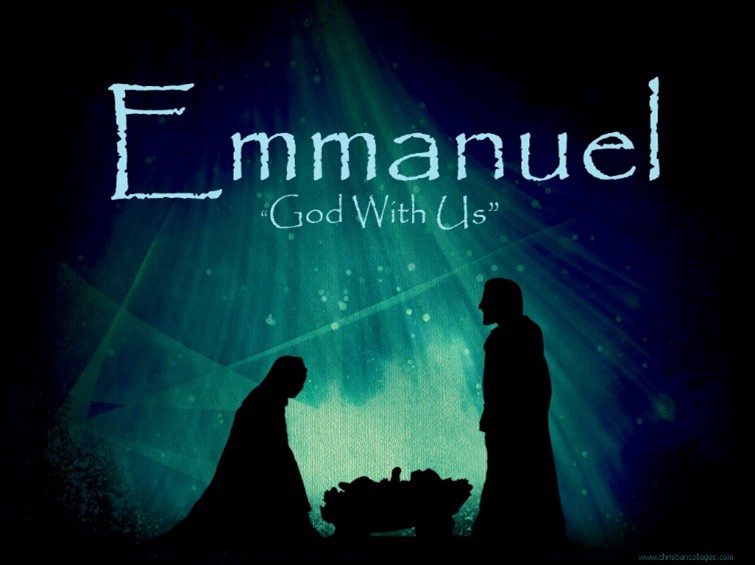
Christmas is coming, and although the media and the decorations and articles for sale in all stores try to push us to believe that it has been Christmas right after Thanksgiving Day, the fact is that the Christmas season consists of twelve days, from December 25 to January 5.
There is nothing wrong, many would argue, with entering the Christmas spirit beforehand, especially when the world has gone through so much suffering during the last two years, and it seems that this year we are able to celebrate without so many restrictions at last!
Granted. There is nothing wrong with a certain anticipation of the Christmas celebrations. After all it has always been the case to prepare for Christmas by decorating, by putting up a Christmas tree, by preparing for the main celebrations. And Advent is the season that puts us into the mood of entering into the joy of Christmas by preparing ourselves properly.
It is well known by all that Christmas is essentially a Christian celebration, and some people even enjoy the beauty of the Christmas carols and songs, that tell the story of Jesus’ birth and our salvation through Him, even when they are not even religious people.
But unfortunately for many Christmas has become just one season of partying and exchanging presents, of showing off with the most expensive decoration in the neighborhood, of dazzling our relatives and friends with the finest of all celebrations, and sometimes attending the local church, especially when our children or grandchildren are performing, to show them our support.
It is urgent that we Christians rescue the true Christmas for all!
While I was still in Cuba, and for several decades the government decided that the Christmas celebrations had no place at all in an atheist country, I remember one Episcopal priest once say from the pulpit that he was glad it was so, because then those who celebrated Christmas really celebrated it with its true sense, even if there were no presents to exchange, or no Christmas trees to buy.
I was not so sure that this priest was right at that moment. I really regretted that Christmas Day was not even a holiday in the calendar in Cuba, and unless it fell on a Sunday we had to go to work during the day and have our celebration at church in the evening.
Nowadays I see a lot of truth in what this priest said then. Of course I am not in favor of abolishing the Christmas celebrations from our calendars, but I do think that going back to the true sense of Christmas is a must.
So what is the real sense of the Christmas celebration?
It may seem obvious. Anyone—even someone who is not Christian—will readily tell you that we celebrate the birth of Jesus Christ, and they will probably add, “although we know that Jesus was not really born on December 25.”
But there is a much deeper sense in the Christmas story. It is a story about incarnation, about God with us, God made man by the power of the Holy Spirit through a virgin. God that came down to us to in human form to show us what His love is like, by His infinite grace, and not by any merits of ours.
By becoming perfectly human, in the humblest of ways, God has revealed to us how infinitely great His saving grace is. In Jesus Christ God revealed Himself as the One who loves us unconditionally, and gives Himself for us in sacrifice, so that we may live abundant, everlasting, and real lives in His love.
In his letter to Titus, the Apostle Paul expresses this truth eloquently in these words, “For the grace of God has appeared, bringing salvation to all, training us to renounce impiety and worldly passions and in the present age to live lives that are self-controlled, upright, and godly, while we wait for the blessed hope and the manifestation of the glory of our great God and Savior, Jesus Christ.”
So this is the true message of Christmas, the one we need to rescue for all. It is the most joyful of messages because God has made Himself known to us, and has come to live with us that our lives may be transformed back into the image and likeness of what we have always been meant to be—the resemblance of our loving God—and be partakers of the wonderful glory of His son, Jesus Christ our Lord.
Fr. Carlos Expósito, Rector
|
RETURN TO TOP
What Good News?
This Sunday and Beyond - December 18, 2022
Get it in PDF form with calendar

Christians, and probably a good number of non-Christians who are familiar with Christian terms, have heard a lot about the Good News of salvation that we Christians proclaim. Many are also quite familiar with the fact that Good News is the equivalent of the term Gospel in English, although this latter word is also understood by plenty of people to refer to a particular musical genre.
When the Advent season is well on its way, practically coming to its end, proclamation of the Good News becomes a must in every church and every Christian circle. People are willing and more than eager to hear good news, especially in times when almost 99% of what you hear, read, and see in the media is terrible news.
There is even a modern trend to exacerbate the morbid side of news and to make catastrophic predictions about the near and far future of humankind. And media owners are happy to provide us with this kind of information regardless of its objectivity.
So we come to the question at the title of this article: What Good News are we proclaiming amid all this chaos?
We may think that the times we are living are the worst in the history of humankind. Opinions may vary in this respect, and probably everyone has said the same about the times they lived in. The fact is that the world has been chaotic for centuries now, and the situation did not look particularly promising to the people living in Jesus’ time or a few years after his life time on Earth.
Paul’s times were particularly convoluted. The Roman Empire was conquering and keeping more and more territories under its dominions, but there were revolts and unrest everywhere. People lacked freedom and were subject to unjust taxation, which made life miserable for a great part of the population.
The new converts came from different religious and social backgrounds, but they all had the most important thing in common: they had been born anew in Christ, and the way they related to one another, and to the rest of society and creation was based on the practice of Jesus’ Way of Love.
These converts had made radical changes from the way they lived before, when their lives were stuck in self-centeredness: the poorer keeping the little they had to themselves to survive, and the richer selfishly clinging to their wealth. They had now learned the true meaning of abundant life—a life based on sharing, on giving to the other, on letting God’s abundant life in love flow like an unstoppable flood.
This change was not an easy one. In some cases it might have taken place more promptly and smoothly than in others. Many might have still clung in part to the old ways, and were struggling to adopt Jesus’s Way in their new lives,
As it happened then, it still happens nowadays, and we must be constantly reminded and urged to leave the old selfish ways behind and embrace Christ’s radical Way of Love.
No matter how hard we may struggle, this has been, is, and will always be the greatest of news in all times. Paraphrasing the Apostle Paul in his letter to the Romans, we can proclaim “the Good News concerning God’s Son, who was descended from David according to the flesh and was declared to be Son of God with power according to the spirit of holiness by resurrection from the dead, Jesus Christ our Lord, through whom we have received grace and been sent to bring about the obedience of faith among all the peoples of the world for the sake of His name, including ourselves who are called to belong to Jesus Christ.”
Belonging to Him whose immeasurable love created us is the greatest of news always. When in our stubborn self-centeredness we forgot the joy of true living, and were enslaved to the stagnation of lack of love and indifference, He even gave Himself to us in sacrifice to bring us back to real and abundant life.
But if we keep this Good News to ourselves we have not grasped its gist. The gist of the Good News of Jesus Christ, as Paul reminds us, is that we become apostles—sent out—to spread out this faith among all nations for the sake of His name. This news is so good that not spreading it out to the world would be unthinkable. Like the overflowing river of love that runs in our lives when we belong to Christ, the Good News flows out to all, and cannot be contained.
Fr. Carlos Expósito, Rector
|
RETURN TO TOP
Joyful Patient Wait
This Sunday and Beyond - December 11, 2022
Get it in PDF form with calendar
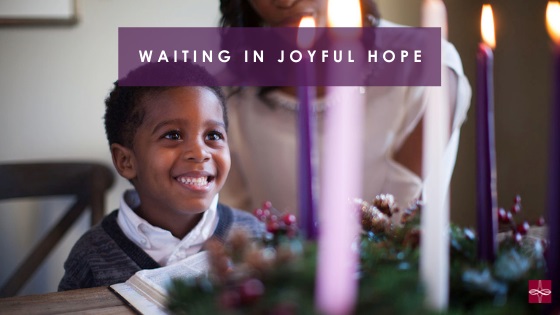
It probably strikes you as odd that there may be anything joyful in waiting. This world of ours has accustomed us so much to impatience, to getting things done ASAP, that we feel uneasy and even angry when there is a need to be patient and wait.
Long waits look like a waste of time to most of us. Time is money as the well-known slogan has it. When it comes to making money, this may be true in most cases, but when it comes to God’s Kingdom, things need to be considered from a totally different perspective.
In this Sunday’s first reading in our lectionary, we have a text from the Prophet Isaiah (Isaiah 35: 1-10) in which the idea of joy appears eight times in different ways, all in reference to the coming of a time of restoration, justice, harmony, and great gladness to which the Prophet was pointing in his time.
It is clear that the Prophet was not referring to the time he and the people were living at that moment. Brokenness, injustice, great inequity, and all sorts of evils were to be found wherever the Prophet and his fellow citizens looked. But it was his total conviction that this joyful time would come because the wait was on God’s promised time, and God never deceives.
Centuries have gone by, the new era has already been inaugurated by Christ’s coming to the world, but the total fulfillment of Isaiah’s prophecy of a kingdom of fullness in God’s love and life is still to come.
Does this prove the Prophet wrong by any means? Absolutely not. It simply reminds us that God’s time of fulfillment is not our time and is certainly not compatible with our impatience. It is, however, the most joyful of all times, because it waits in the Lord’s sure promise of total redemption and complete fullness of life.
In his letter, the Apostle James in chapter 5 encourages his readers to be patient until the coming of the Lord, and makes a comparison with the way a farmer waits for the precious crops of the earth, “being patient until it receives the early and the late rains.” Surely the farmer awaits these crops with great joy, and with assurance that this will normally be the outcome.
The farmer knows from experience that there is nothing he can do to get the crops more speedily. If he tries to get them before due time, he will only get half-formed crops that will be good for nothing.
Waiting patiently is a virtue that is not easy to attain, especially not in the times we are living. For some people it may come more naturally than for others. But waiting patiently must not be confused with quietism or sloth.
James, the very writer who insists on the importance of waiting and puts the patience of the prophets as an example, is well-known for being the New Testament writer who makes it clear that fruits of good works must necessarily accompany the true faith of believers.
Even in this chapter where he insists on patient wait, he encourages his readers to strengthen their hearts, and that is a goal that requires really active inner work!
Advent is the season of patient waiting, but not the season of inactivity. The readings constantly remind us of the inner work of repentance that this preparatory time entails, and of the fruits of good works that must show forth that we are prepared to receive Our Lord in our lives. And it is certainly the season of rejoicing, because in God’s time His Kingdom is at hand!
Fr. Carlos Expósito, Rector
|
RETURN TO TOP
Hope Through Repentance
This Sunday and Beyond - December 4, 2022
Get it in PDF form with calendar

Repenting—turning to God—and preparing the way for our salvation are the two main themes of this week’s readings, summed up in the Collect for this Second Sunday of Advent.
The prophesy in the Book of Isaiah (Isaiah 11: 1-10) tells us about a ruler whose lineage would come from Jesse (King David’s Father) who would establish a kingdom of real righteousness, justice, peace, and harmony, not only among the inhabitants of Israel, but in all the world, including not only humans, but all the creatures of the earth as well.
It will necessarily be the time of judgment, in which the meek and the poor will receive righteousness and equity, and the wicked shall be destroyed. There can be no real equity and harmony while the wicked rule the world.
The prophets’ call throughout the Bible has always been clear. It is a call to repentance, to a total change of mindset which entails a total change in our way of acting.
God loves all His creatures, including His special creation: us human beings. He does not want the destruction of His beloved creatures, but greed and injustice, cruelty, lack of love and indifference have to be wiped out and transformed into a new and loving kind of relationship among all creatures so that “the earth will be full of the knowledge of the Lord as the waters cover the sea”, as Isaiah proclaims.
As verses 4 and 6 of Psalm 72 put it, referring to this righteous ruler: “He shall defend the needy among the people; He shall rescue the poor and crush the oppressor.” “In His time shall the righteous flourish; there shall be abundance of peace till the moon shall be nor more.”
And referring to God’s teachings through Holy Scripture, and our true salvation through Jesus Christ, in his letter to the Romans, chapter 15, Paul says, “May the God of steadfastness and encouragement grant you to live in harmony with one another, in accordance with Christ Jesus…”
And later on Paul says, “May the God of hope fill you with all joy and peace in believing, so that you may abound in hope by the power of the Holy Spirit.”
So the Christian hope of a life filled with joy and peace comes about as a result of true repentance—turning to God’s Way of Love—which can only be achieved through the power of the Holy Spirit.
Preparing the way to receive Him in our lives is, as John the Baptist openly stated, a call to “repent, for the kingdom of heaven has come near.”
The total realization of our Christian hope—a complete state of harmonious living—may seem far away from us in this world of ours, but each and every one of us is called to make the difference—no matter how small we may believe it to be—by becoming active agents of this greatly needed transformation.
However, no one can be an efficient agent of positive transformation unless they have undergone their inner transformation first. This is where so many “systems” have failed by trying to change society from the outside, without considering the inner transformation of each person first.
The Christian faith firmly proclaims justice and equity, harmony and the care for the needy and the oppressed. These have always been its tenets. But the only true transformation that will bring God’s Kingdom closer is repentance, a true turning to God’s rule, that can only take place through our willing acceptance of God’s Spirit of Truth, and Christ’s Way of Love in our lives.
Fr. Carlos Expósito, Rector
|
RETURN TO TOP
Putting on the Armor of Light
This Sunday and Beyond - November 27, 2022
Get it in PDF form with calendar
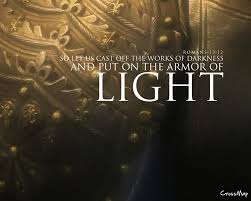
On the First Sunday of Advent the Collect urges us to “put on the armor of light in the time of this mortal life…”
Armors were familiar to everyone in the Roman Empire of the time, and St. Paul often made use of images referring to what soldiers wore to refer to the way Christians should be spiritually vested to defend themselves from the attacks of the evil and dark forces of the visible and invisible worlds.
The second reading for this Sunday is Paul’s letter to the Romans, chapter 13, verses 8 to 14, and in this excerpt of the letter the Apostle declares, referring to the times the converts to the New Way are living, “let us then lay aside the works of darkness and put on the armor of light.”
Paul refers to that time as “it is now the moment for you to wake from sleep.” Notice the use of now to refer to the precise moment to be aware of the need to make the radical change from a life lived in darkness to a life illuminated by Christ’s living light.
The now of Paul’s addressees in this letter may be chronologically far from our now, but Paul’s injunction to turn to the new life in Christ’s light and love is not bound by time; it is as essentially present today as it was then.
In the preceding paragraph of this letter Paul had clearly reaffirmed what is said in the Gospels about the commandment to love your neighbor. He says that all commandments are summed up in this word, “Love your neighbor as yourself.”
So when Paul talks about the armor of light, he is clearly referring to putting love of your neighbor into practice.
The way he exemplifies how this putting in the armor of light is translated into practice is this: “let us live honorably as in the day, not in reveling and drunkenness, not in debauchery and licentiousness, not in quarreling and jealousy.”
Living honorably implies living a life devoted to the love of God, which implies loving your neighbor as yourself, and not giving in to the selfish ways of self-complacency, which not only corrupt our bodies and minds, but make us self-centered and oblivious of (even sometimes contentious against) our fellow human beings.
At the end of this excerpt of the Letter to the Romans, Paul uses an image that sums up and brilliantly clarifies what he means by the armor of light.
He says, “put on the Lord Jesus Christ”.
Putting on our Lord as our vestment, putting on the Light of lights, the Love of loves. This is the total transformation of our lives into His life, the real turning to God, and the most powerful armor against all evil.
Fr. Carlos Expósito, Rector
|
RETURN TO TOP
Glorious Loving Power from the King of Kings
This Sunday and Beyond - November 20, 2022
Get it in PDF form with calendar
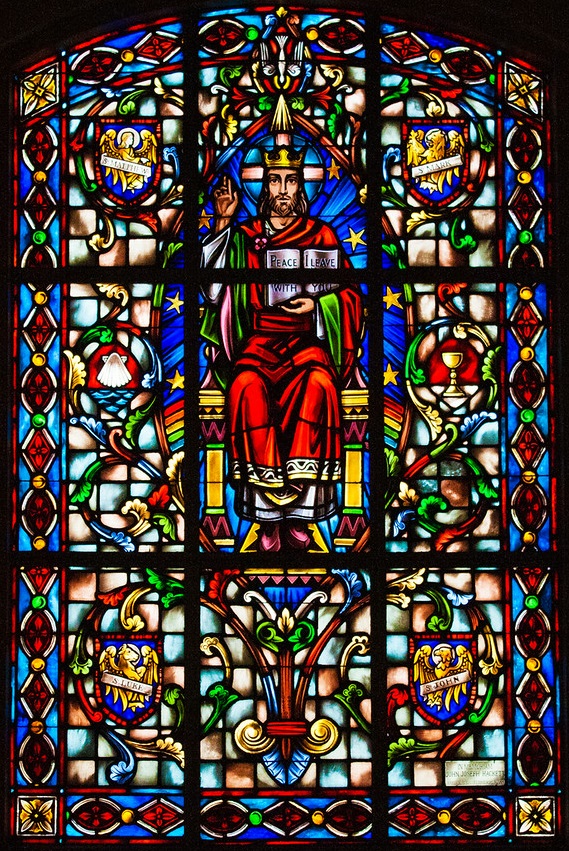
For several decades now, the Episcopal Church has joined the Roman Catholic Church in celebrating the last Sunday of the Ecclesial Year as Christ the King Sunday.
In so doing, we join in the recognition that the long-awaited Savior that was eagerly expected in the Advent Season, incarnate at Christmas, manifested as God’s beloved Son in Epiphany, unjustly tried and crucified by the dark powers of the day during Holy Week, gloriously resurrected at Easter, and later on ascended to be in perfect union with His Father and Our Father, is indeed the unquestionable King of Kings and Lord of Lords of our world, and all the worlds visible and invisible.
There has always been, especially in our modern age, a tendency to oppose kingly power and the manifestation of true love.
Interestingly, in the Hebrew Bible we do not find kings, but judges—people who were recognized by the people for their wisdom and character to represent their interests—until the time of Saul and David. Even the Prophet Samuel warned the people about the dangers of adopting a monarchy, and only accepted it as an inevitable evil due to the perils of the strong nations surrounding them that were ruled by kings.
Later on, the Israelites always held the ideal that a true King should always recognize God’s supremacy, and rule under His guidance to favor justice and show mercy to the people. Their ideal Messiah would be a king whose rule would restore peace and harmony to Israel and all the nations; all would be healed and death would be no more.
This is why when Jesus—whose powerful words and deeds of reconciling love were well-known by most of the population—enters Jerusalem mounted on a donkey for the Passover Feast, He is proclaimed as the King who comes in the name of the Lord.
When monarchies all around the world were replaced to a great extent (some countries still have them, but their real power has been greatly diminished) by more democratic forms of government, it was done mainly because people rejected the absolute power of sovereigns, which in most cases did not represent the people’s interests they were claiming to defend, but their own personal interests and whims.
Nothing is farther away from the manifestation of true love than the concentration of power in the hands of a tyrant whose rule only serves themselves and their close relatives, friends, and allies. Absolute power of this kind in almost ninety-percent of the cases totally corrupts those who hold it, and becomes a real curse for the society in question.
For our present-day minds it is often hard to relate the idea of absolute power with reconciling love, even when we acknowledge that our loving God reigns supreme in the universe.
Most of the time we would rather call Him Father than Omnipotent God, although the latter name is still widely used.
In the case of Jesus, the perfect image of the invisible God, because He is totally human as He is divine, it is perhaps even harder to associate Him with an absolute ruler.
His life was one of authentic humility and self-sacrifice, to the point of giving Himself to us for the sake of love. Even so, it is undeniable that even while still on earth He gave signs of His power over the forces of darkness and evil, casting them out and restoring lives to wholeness.
One of the best writings in which we can better understand how the idea of relentless love and power can be reconciled is the fragment of the letter of Paul to the Colossians that the lectionary brings us for this last Sunday of the Ecclesial Year (Colossians 1: 11-20).
I strongly recommend the reading of this whole piece of Scripture, but I would like to highlight some parts here that can help us grasp the appropriateness of calling our Savior King of kings and Lord of lords.
“He Himself is before all things, and in Him all things hold together. He is the head of the body, the church; He is the beginning, the firstborn from the dead, so that He might come to have first place in everything. For in Him all the fullness of God was pleased to dwell, and through Him God was pleased to reconcile to Himself all things, whether on earth or in heaven, by making peace through the blood of His cross.”
Could anyone have said it more explicitly? I hardly think so.
Fr. Carlos Expósito, Rector
|
RETURN TO TOP
Earn Your Own Living
This Sunday and Beyond - November 13, 2022
Get it in PDF form with calendar

“Anyone unwilling to work should not eat” may look like a communist slogan. In fact it has been used by communists to prompt people to work hard and earn their own living, even when the main leaders do not usually apply the saying to themselves. But these words are actually taken from Paul’s Second Letter to the Thessalonians.
The saying probably predates Paul by centuries, since in the Jewish tradition, and also in the tradition of most cultures, people who were simply unwilling to work and live on others’ toil were not well seen. They were the parasites of society, rejected by everyone.
In more modern times, even capitalist societies, mainly under the influence of Calvinism, have always encouraged labor and busyness as the only way to make real material progress in life.
Jesus Himself was a carpenter by trade, and most of his closest followers were fishermen. Although the Gospels tell us about them going from town to town carrying the Good News, healing the sick, and feeding the multitudes both materially and spiritually, we do not know for sure that during all this time they did not do any work to earn their living.
Actually, they did a lot of work. Even if it was not carpentry or fishing, they practically had no time to rest, and on several occasions when they tried to find some solace by going to a quiet place, the multitudes found them, and they had to minister to those in need.
As Jesus Himself said, “the worker is worthy of his wages”, so He considered that it was only natural that people who received the disciples in their homes gave them food and shelter.
Paul was aware of this, and in this second letter to the Thessalonians he said, “with toil and labor we worked night and day, so that we might not burden any of you. This was not because we do not have that right, but in order to give you an example to imitate.”
He is clearly stating that he and his companions had the right to receive food and shelter from them because of the ministry they were performing, but they preferred to earn their own living through hard work, to give them an example of how to act as true followers of Christ.
Some of the new converts to Christianity at Thessalonica had misunderstood Paul’s message about Christ’s coming and, since Paul himself had hinted that it would be taking place soon, they had decided to be idle and simply wait for Christ’s coming. They saw no purpose in working or carrying out their usual activities anymore.
What these followers did not realize was that by so behaving they were imposing a burden on the rest and living as parasites, which was never Christ’s teaching.
Loving our neighbors does not by any means imply letting them live on us, unless they are people who cannot work, due to advanced age or disability.
A society based on Christian principles must provide for the elderly and the disabled. As Christians we should do all we can to help those who cannot work, but we should not encourage those who are able to work to live on us. A society that does that is not really helping anyone but creating a serious problem: the proliferation of parasites.
The best way to help others is, whenever possible, to restore them to their physical and mental health so that they can earn their own living. Programs that aim to do this are needed more than ever in our society.
As Paul pointed out to the Thessalonians, we should not be “weary in doing what is right.”
Fr. Carlos Expósito, Rector
|
RETURN TO TOP
A Great Cloud of Witnesses
This Sunday and Beyond - November 6, 2022
Get it in PDF form with calendar
"Seeing we are compassed about with so great a cloud of witnesses, let us lay aside every weight and the sin that so easily besets us."
Hebrew 12:1 (KJV)
From the Rector
The following sermon was preached by the Most Reverend Rowan Williams, Archbishop of Canterbury on All Saints Day in 2009. The Archbishop was speaking at a time of potential upheaval and disintegration of the Anglican Community. Even though the situations differ from our own time, the themes still resonate.
Read more
|
RETURN TO TOP
Let Us Argue It Out
This Sunday and Beyond - October 30, 2022
Get it in PDF form with calendar
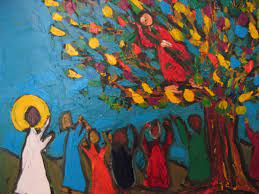
“In the first chapter of the book of Isaiah, the writer put down the Lord’s words as an argument between Him and the people, particularly the rulers that were defrauding the most vulnerable among the population: the oppressed, the orphan, and the widow.
He stressed the futility of performing all burnt offerings and sacrifices, and following all appointed festivals strictly, if there was no justice and their hands were full of blood and evil. The Lord even refused to listen to their many prayers unless they changed their evil ways.
And then God made it clear that there could be a way to argue all this out: the way of true confession of all their sins which led to real repentance and amends for all their evil doings.
It is worth noticing here that the way out that the prophet puts down as God’s true Word has nothing to do with the magnitude of the sins committed, but with the truthfulness of their repentance.
“Though your sins are red like scarlet, they shall be like snow; though they are red like crimson, they shall become like wool. If you are willing and obedient, you shall eat the good of the land”, says the Lord through the prophet’s writing.
The Lord’s argument with the sinners is not a rendering of accounts, as might be expected. He does make everyone accountable for their own sins, but instead of instant condemnation God offers the sinners the benefit of a clean slate if there is true repentance and amends are made to the wronged ones whenever possible.
This is the great contrast that Psalm 32 expresses in verses 3 and 5-6, “While I held my tongue, my bones withered away, because of my groaning all day long…Then I acknowledged my sin to you, and did not conceal my guilt. I said, ‘I will confess my transgressions to the Lord.’ Then you forgave me the guilt of my sin.”
In these verses of Psalm 32 we find the same idea expressed in Isaiah, but from the sinner’s perspective. It clearly shows how much better life becomes when we openly confess our sins to our Creator and are authentically willing to make a definitive change. Our guilt is removed, and we are renewed by God’s endless grace and love.
The Gospel reading for this Sunday tells us about the encounter between Jesus and Zacchaeus, a chief tax collector who was rich. This man was greatly despised by the people and the Jewish religious rulers, because tax collectors usually charged more than was due, to make profits for themselves, and also because they worked for the hated Roman Empire. In this particular case, the man in question was not a simple tax collector, but a chief one, which made him even less popular.
When Jesus asked Zacchaeus to host him for the night, all were scandalized and grumbled at Jesus for becoming the guest of this great sinner. But the narrative shows us how much Zacchaeus repented of his evil doing, and his life was totally changed, precisely because he felt God’s love and forgiveness shown through Jesus’ acceptance of him.
Here again we see God’s forgiving grace and love at work, transforming someone’s life for the better and prompting this man to make amends to those he had wronged. This also sets an example of what a clear perspective of sin and repentance should be.
As Jesus Himself pointed out at the end of this narrative, “the Son of Man came to seek out and save the lost”, and so must we, as His true followers.
Fr. Carlos Expósito, Rector
|
RETURN TO TOP
Saved for God's Kingdom
This Sunday and Beyond - October 23, 2022
Get it in PDF form with calendar

“The Good News” is the phrase that we normally use to explain the term gospel (Evangelion in the original Koine Greek). Actually, this is what the term literally means. When the New Testament writers started to use the term, it simply meant good news with no specific connotation to it.
Obviously what the New Testament writers meant was not any kind of good news—that the taxes had been considerably decreased, for instance—but the Good News of Salvation proclaimed to all through Jesus’ passion, death, and glorious resurrection and ascension.
Another term also used to refer to this Good News was the Message, which is the one used by St. Paul in the second reading passage for this Sunday (2 Timothy 4: 6-8, 16-18).
We are all familiar with these terms and, if asked, most of us would affirm that we understand what this New Testament phraseology, which has been so many times repeated by the Church throughout the centuries, means.
It now comes to my mind that while I was a seminarian, one of my theology professors used to challenge us when we used the term salvation, by asking, “and what are we saved from?”
As seminarians, we always thought we knew everything there is to know about our faith—how wrong we were! — and we simply answered by repeating trite phrases like, “from sin and damnation, of course!” Such an obvious fact!
And it is true that we are saved from sin and damnation, but how can we express this “obvious” fact in more concrete terms? How do we relate this to our everyday living, to our everyday encounters with others, within the family life, in the neighborhood, in our work and study places, in our church communities?
Perhaps a good and deep reading of this excerpt of St. Paul’s Second Letter to Timothy can give us a better idea of what kind of salvation we Christians should aim for at all times.
In this part of the letter Paul starts by stating that he knows for sure that his physical life is about to end. Not because of old age or disease, but because he knows he will be executed due to his staunch and unwavering position in relation to Jesus’ message. His words to define this situation are, “I have fought the good fight, I have finished the race, I have kept the faith.”
And he finishes this part saying, “The Lord will rescue me from every evil attack and save me for His heavenly kingdom.”
It may seem contradictory that the Apostle Paul talks about his upcoming execution while at the same time stating that he will be rescued and saved by the Lord. But let us pay close attention to what Paul says he will be saved from: “every evil attack.” And what he will be saved for: “His heavenly kingdom.”
He is not saying that the Lord will protect him from death (even this unjust death) or that his opponents will be prevented from attacking him, but that he will certainly know how to respond to these attacks thanks to the inspiration of the Spirit of Truth, and his unwavering clinging to the Truth.
And he knows where the crown of glory that he is expecting will be given him: in God’s heavenly kingdom, when God is all in all, when God’s original plan of full and abundant life for all in true communion with Him, with one another, and the whole of creation becomes a reality.
So let us re-evaluate our wishes to be saved. Are we going to be whining and asking God to save us from the hardships of life, from our conflicts with others, from our discomforts, or even from physical death?
Or shall we rather ask God to save us from indifference, from lack of commitment to proclaiming His Way of Love with our words and actions, from lack of courage to forgive and love even those who have hurt us?
Yes, the Good News is news of Salvation. Let us then be clear what we are saved from and for.
Fr. Carlos Expósito, Rector
|
RETURN TO TOP
The Work of an Evangelist
This Sunday and Beyond - October 16, 2022
Get it in PDF form with calendar

In his second letter to his disciple and church leader Timothy, Paul encourages him to continue doing his evangelistic work firmly and consistently.
It is noteworthy to consider that Paul starts by reminding Timothy of what he has “learned and firmly believed” , knowing also from whom he has learned it, and making reference to how from childhood he has known “the sacred writings that are able to instruct for salvation through faith in Christ Jesus.”
Sometimes when we read Paul’s letters we tend to forget that the New Testament as such did not exist in his time. It was his writings that came to make up a good part of the New Testament, together with the four Gospels that were accepted as canonical, and other writings from other apostles.
So it is clear that the sacred writings Paul is referring too are the Hebrew Bible, or Old Testament—as it is known among us Christians.
It is good to remember this, and also that Jesus always referred to this Hebrew Bible as the scriptural basis for all He said and did.
However, Paul adds in his letter to Timothy, “through faith in Christ Jesus”.
It was a thought shared by all New Testament writers that in Jesus Christ all Scripture is recapitulated and fulfilled.
What the resurrected Jesus did when He accompanies the two disciples on the way to Emmaus was precisely this. He showed them how all the Scriptures ultimately relate to Him as the fulfillment of all that has been prophesied.
Paul insists in the value of Scripture for all those who are to proclaim the Good News of
Salvation. He says to Timothy, “All Scripture is inspired by God and is useful for teaching, for reproof, for corrections, and training in righteousness, so that everyone who belongs to God may be proficient, equipped for every good work.”
It is worthwhile noticing here that he highlights how the proper knowledge and interpretation of Holy Scripture is essential in order to be properly equipped for the work every authentic follower of Jesus must carry out.
When we think of evangelists, maybe people like Billy Graham come to our minds, but we forget that Jesus Himself commissioned His followers to “go and make disciples of all nations…and teach them to obey everything I have commanded you.”
That commission has been given to all who call themselves Christ’s followers, so yes, it is given to you who are reading this—if you call yourself a Christian, and to me who am writing it.
Paul is also well aware of all the hardships that Timothy and all those who engage in proclaiming the Good News are going to face, so he urges him to “be persistent whether the time is favorable or unfavorable; convince, rebuke, and encourage with the utmost patience in teaching.”
A sound knowledge of Scripture plus a great deal of aid and inspiration form God’s Holy Spirit of Truth will be needed to carry out this essential task.
Apart from this, we need to be invested with the proper character and disposition of a true follower of Christ, so that as Paul entreated Timothy to do, we may also “always be sober, endure suffering, do the work of an evangelist, and carry out our ministry fully”.
Fr. Carlos Expósito, Rector
|
RETURN TO TOP
Faith That Translates into Faithfulness
This Sunday and Beyond - October 9, 2022
Get it in PDF form with calendar

This Sunday’s readings tell us about faithful people and our faithful God.
The book of Ruth tells the story of a daughter-in-law who refused to leave her mother-in-law alone after she had lost her husband and her two sons (one of whom was Ruth’s husband). Although Ruth and her mother-in-law Naomi were from different lands and cultures, when Naomi decided to return to Judah, and even insisted that Ruth should leave her because there was no purpose for her in following her mother-in-law to a land which was not even her own, Ruth clung to her relentlessly, showing her gratefulness for all that Naomi had done for her, and a total faith and trust that by staying with her she was fulfilling God’s will and God would somehow provide for them both. The end of the book shows how Ruth’s faithfulness was not in vain, and she and Naomi were able to live a better life among God’s people.
In his second letter to Timothy, the Apostle Paul encourages his disciple to be faithful, to share in Christ’s sufferings when needed, and makes a comparison between the life of Christ’s followers and those of soldiers, athletes, and farmers, stressing that it is only disciplined hard work, dedication, and perseverance which brings the fruition of the salvation that is in Christ Jesus. Paul here uses a saying which he assures Timothy that can be trusted:
If we have died with Him, we will also live with Him;
If we endure, we will also reign with Him;
If we deny Him, He will also deny us;
If we are faithless, he remains faithful—
For he cannot deny Himself.
So what Paul is saying here is that our faith needs to be based on our true faithfulness to Christ’s Way, even to the extent of making great sacrifices on His behalf, so that others who see our behavior may also come to believe.
But most importantly, Paul is highlighting here that our God and Savior is intrinsically faithful, even when we may fail to be so. God can simply not be unfaithful, because that is contrary to His very nature.
This is also hinted in a beautiful poetic way by the writer of Psalm 113:
“Who is like the Lord our God, who sits enthroned on high
But stoops to behold the heavens and the earth?”
“He takes up the weak out of the dust
And lifts up the poor from the ashes.”
Here God’s transcendence is contrasted with His unfailing faithfulness to His people. They go hand in hand.
True faith implies complete trust in our Creator, His Son our Savior, and His comforting Spirit of Truth. It also means being grateful for all His constant blessings and showing forth this gratefulness through our faithfulness to His Way of Love.
In the Gospel reading for this Sunday, ten lepers who beg Jesus to heal them are healed as they are on their way to see the priests, as Jesus has commanded them to do. However, only one of them—a Samaritan—turns back immediately to praise God loudly and thank Jesus.
What Jesus says to this Samaritan contains a great lesson for us all: “your faith has made you well.”
It is clear that Jesus is not referring to his healing from leprosy. That had already happened before he decided to return and express his thankfulness and faithfulness.
It is his faithfulness expressed through his great gratitude that makes him really well. It makes him well because it brings him closer to God’s very nature. As Paul points out, God is faithful by nature, so when we are truly faithful we show forth His image in our lives.
Fr. Carlos Expósito, Rector
|
RETURN TO TOP
"Queen Elizabeth's Anglican Faithfulness"
The Rt. Rev. Rowan Williams
This Sunday and Beyond - October 2, 2022
Get it in PDF form with calendar

A great deal has by now been written about Queen Elizabeth, and ample tribute has been paid to her stature. It has been intriguing to see how commentators have tiptoed around the question of her personal faith: everyone who has given this more than a second’s thought recognizes that her Christian commitment was deeply part of her, but it has been obvious that, for many, this is something impenetrably strange, almost exotic.
And in a way you can see their problem. Her Anglican faith — like that of her father and grandfather — was redolent of a lost world in which weekly Matins, fervent but infrequent Communion, very private prayer, and unquestioning honesty and uprightness went together. John Betjeman’s poem on the death of King George V described his mourners as “Old men who never cheated, never doubted, / Communicated monthly”; something of this lived on in the queen. That deep, unshowy piety, nourished by the prayer book and the King James Bible, seems very remote in an Anglican world like ours. Even the most dedicated supporter of the prayer book will have grown up in a cultural climate where none of this could be taken for granted as it once had been.
But it would be a crass mistake to think that it produced an inflexible conservatism, let alone moralism. The depth of this subdued devotion seems to have allowed the queen — as it had allowed some of Betjeman’s “old men” — to adapt with stoical courage to new circumstances, to look with charity if not always approval at new styles of behavior, even to think new thoughts where necessary. The queen proved adaptable, self-critical, tolerant, and unfazed through a near-century of colossal upheaval. Her patent conviction that her role was a matter of divine vocation and that her anointing was a promise of grace and divine faithfulness allowed her to be strong enough to grow and change.
When she was awaiting her Coronation, Archbishop Geoffrey Fisher, for whom she retained much respect, prepared for her a book of daily prayers and meditations to guide her through the months. It was a book she used and continued to treasure. Some visitors to Windsor Castle would be shown the book, preserved along with other mementos of that period, and it was obvious that it had been formative — almost an equivalent for her of the Ignatian Spiritual Exercises.
These were the foundations for her thinking about her calling. And they helped her make what must have been a difficult discernment in her later years. As British society grew both more religiously plural and more secular, she responded not by watering down what she had to say in her annual Christmas broadcasts but by gently increasing the references to her faith and to the role of religious faith in general.
Reading through these Christmas texts, it is striking that, as her society ceased to take for granted the frame of reference that was hers, she recognized that part of her task was to remind us of it. Never triumphalist, never aggressive, she simply reiterated her own commitment, her acknowledgment of God’s grace, and her insistence on the need to remember what the Christmas festival was actually about.
Contrary to what some over-anxious and over-apologetic observers might have feared, this did not offend or alienate the faithful of other communities. It reassured them that the monarch understood how and why faith mattered. And that was partly because she was increasingly willing to take part in interfaith events (and was indeed criticized by some Christian rigorists for doing so). This might be at large public events like Commonwealth Day services.
But my strongest memory is of an event at Lambeth Palace, late in my time as archbishop, when we had organized a small exhibition of treasures from different faith traditions and invited the queen to come and view this, to meet a number of religious leaders, and to address the group. What she said in her address was a powerful statement of a genuinely theological rationale for the Church of England’s role in a religiously plural society.
If there is an “established” church, to which certain legal privileges are given, it is essential for it, in its collective imitation of Christ, to use whatever privilege, access, or resource it has to make sure that other communities are not excluded, to reinforce the voice of minorities in the public realm. If the Church of England was in some sense the “state church” (not the most helpful of terms), it must be a church willing to act for the good of the whole social community; and that meant being attentive and supportive to those whose voices might be muted or suppressed, those who did not feel that they had an entrée into public discussion.
In the United Kingdom, solidarity with Jewish and Muslim communities under different kinds of threat was an obvious imperative, but all faith groups would need the same faithful friendship. It was a vision the Church of England tried to flesh out in various local and national projects, including Near Neighbours, which looked to build local collaborative ventures by faith communities in support of the needy or marginalized. The queen gave her unambiguous backing to this vision.
So: a deeply traditional believer, whose adherence to the faith was beyond doubt (and who could privately, so they say, be a bit caustic about over-enthusiastic liturgical or theological reformers); but one whose depth of fidelity allowed her to discern, adjust, think ahead. Someone who had a clear sense of the church’s role in changing times, who did not confuse firmness of faith with loudness of utterance or hostility to strangers.
Queen Elizabeth was an incalculably important person for British society, without doubt. But she also, without ever advertising it, helped to model for her church a particular kind of Anglican faithfulness, confident without arrogance and generous to the entire community she and that church sought to serve. We owe her a very great debt for this, as for so much.
The Rt. Rev. Rowan Williams has served as the 104th Archbishop of Canterbury (2002-12) and 35th Master of Magdalene College, Cambridge (2013-20).
|
RETURN TO TOP
The Life That Really Is Life
This Sunday and Beyond - September 25, 2022
Get it in PDF form with calendar

In his First Letter to Timothy, in chapter 6, the Apostle Paul entreats his beloved disciple to persevere firmly in the faith he has passed on to him, so that he can not only be saved by God’s grace through Jesus Christ’s sacrifice, but can also, as a church leader, be a light that shows the true way of salvation to others.
This entails living a life that shows a deep inner transformation, a life steered by none other than Jesus Christ Himself, whom, according to Paul’s words, “alone has immortality and dwells in inapproachable light, whom no one else has ever seen or can see.”
Paul here refers to Jesus Christ in his divine transcendence, as he met Him on the road to Damascus, after which his life and life mission was totally transformed by His light.
After all, Paul never met the man Jesus personally before he was crucified and gloriously resurrected and ascended. His knowledge of this man is solely based on the disciples’ accounts of his words and deeds. But his deep knowledge of the Law and the Prophets enabled him to make the right connections that made him a true defender of Jesus’ Way of Love.
In his admonition to Timothy, Paul reminds him of the virtues that a true follower of Christ needs to pursue: righteousness, godliness, faith, love, endurance, gentleness. But above all, he encourages him “to take hold of the eternal life.”
How can we take hold of the real abundant life that God wants to give us?
The second paragraph of this section of the letter gives us a hint as to what is meant by “taking hold of the eternal life’.
Here, Paul instructs Timothy to command those who have material wealth “not to be haughty, or set up their hopes on the uncertainty of riches, but rather on God who richly provides us with everything for our enjoyment.”
And right after this, he tells Timothy what these wealthy people should do to gain eternal life: “They are to do good, to be rich in good works, generous, and ready to share, thus storing up for themselves the treasure of a good foundation for the future.”
Life is about relating to others, and to the rest of creation. The very basis of mere biological life lies in mutual exchange with the environment and the other creatures that surround a living creature. A self-enclosed life is no life.
As human beings, we have acquired the peak level of individuation, which is great, because it enables human beings to display a uniqueness in their relationships that had never been achieved by any creature before. Human relationships reach a level of richness and diversity that make us co-creators with our Creator, and the greatest stewards of his whole creation on this planet
Unfortunately, individuation may also lead us to forget how dependent we are on our God, and on the rest of humankind and all other creatures. This is what may lead to self-centeredness, which is usually translated into a selfish drive to amass wealth and other possessions, even trespassing on other human beings and creatures, as if this could ever secure life for us.
Only when we wake up from this delusion, thanks to the Holy Spirit’s transforming grace, can we find the true riches of life—the ineffable inner joy that comes from doing good to all, from sharing our goods with those in greater need, from loving unconditionally, always and everywhere.
Only then can we, as Paul says to Timothy, “take hold of the life that really is life.”
Fr. Carlos Expósito, Rector
|
RETURN TO TOP
Praying for Those Who Govern?
This Sunday and Beyond - September 18, 2022
Get it in PDF form with calendar
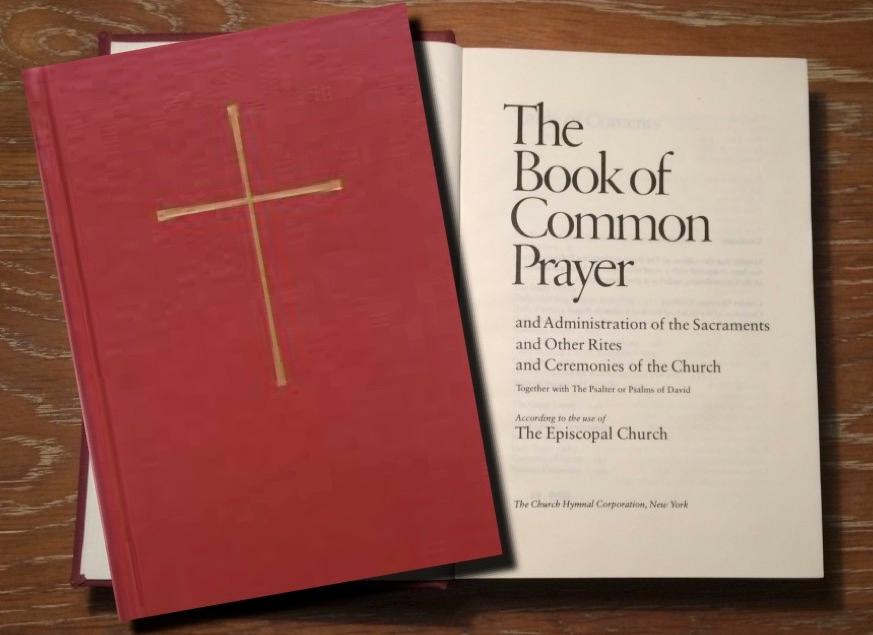
In the different editions of the Book of Common Prayer of the Episcopal Church, as well as in the other Books of Common Prayer in the Anglican Communion, going back to the first one composed by Thomas Cranmer, there have always been collects and prayers for persons of all sorts and conditions, but also special prayers for those in government positions, including monarchs and presidents.
Although there may be some people who may object to the practice of praying for those in charge of government, particularly when it is someone whose policies they find contrary to Christian principles, this practice has been and continues to be an essential part of the Catholic tradition of the Church.
I remember that while living in Cuba and serving as a priest there, I tried to avoid praying for the president of the nation, mainly because I found his government tyrannical, and I knew that he himself was a confessed atheist who would have been happy to see Christianity blotted away in that nation.
Even so, though I struggled with my personal feelings deep inside, I prayed for him out loud (though not in private, I need to confess) because I knew that by doing so I was following the practice of the Church throughout the centuries.
Where does this practice come from?
In his First Letter to Timothy, chapter 2, the Apostle Paul begins with these words: “First of all, then, I urge that supplications, prayers, intercessions, and thanksgivings be made for everyone, for kings and all who are in high positions, so that we may lead a quiet and peaceable life in all goodness and dignity. This is right and is acceptable in the sight of God our Savior, who desires everyone to be saved and to come to the knowledge of the truth.”
So we can see this practice was highly encouraged by the Apostle Paul himself. It is, therefore, a foundational apostolic practice, and departing from it can only mean denying the apostolic faith we have received.
Can we be led to think that Paul encouraged this practice because he was convinced that the rulers of the nations in his time were true representatives of God’s rule?
It would be naïve to think so. In Paul’s writings we can always notice the opposition that he makes between God’s rule and the rulers of this world. He was well aware that unjust rulers had put Christ and many of His followers to death. He Himself had been unjustly imprisoned by the rulers of his time, so he clearly understands the injustice and inadequacy of such earthly rulers, even though he does advise in his Letter to the Romans that we must submit to civil authorities.
His advice to submit to civil authorities is based on the fact that if we act properly in society according to our true conscience, there should not be any contradiction with the authorities that enforce the laws that make peaceful interactions possible in society.
However, Paul himself was outspokenly opposed to these civil authorities when they proposed that he stop spreading the Good News of Salvation in Jesus Christ’s name.
Praying for everyone everywhere is an intrinsic part of our faith. We should earnestly wish deep in our hearts that salvation may come to each human creature created by God, even when they harm us. Jesus Himself urged us to pray for our enemies.
Praying for those in government positions should have a special place in our Christian practice, simply because these persons’ attitudes and behaviors not only affect them personally, but have a direct impact on thousands or millions of people on this planet, and can even determine whether there is peace or war in some parts of the world.
When we pray for people in government positions, we should honestly pray for their souls, that they may be touched by the Holy Spirit, and can receive God’s saving grace, but also that their hearts and minds can be so transformed that they may become instruments of God’s government of peace, justice, harmony, and love.
Now more than ever we need to pray incessantly for persons of all sorts and conditions, and especially for those in government positions, that this hurt and mad world may be transformed into a closer version to God’s intended good world for all His creatures.
Fr. Carlos Expósito, Rector
|
RETURN TO TOP
Called to Serve God by His Loving Saving Grace
This Sunday and Beyond - September 11, 2022
Get it in PDF form with calendar
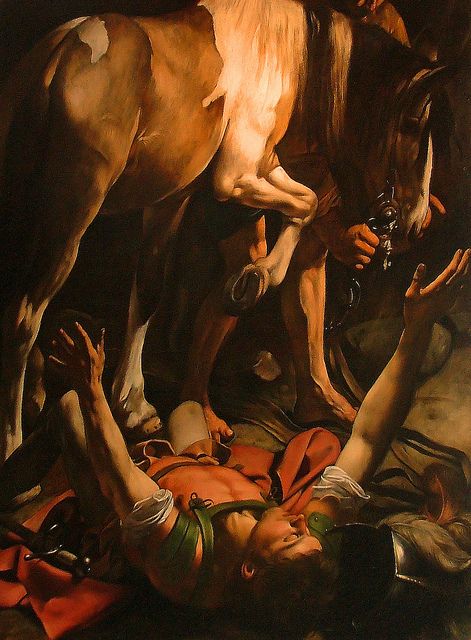
When we think about the Apostle Paul, it is common to remember his rather dramatic conversion, that changed a violent and restless persecutor of Jesus’ Way into one of His most faithful and relentless apostles.
Paul himself wrote about his conversion in several of his writings, and he is not shy to recognize how much he had wronged Jesus Christ and His followers before his transformation, which started on the road to Damascus.
In the conversion story, there is a man named Ananias, who is the person that gives Paul his eyesight back after three days of being blinded by the dazzling light he encountered on the road.
When Jesus asked Ananias to go to Paul where he was staying and give him his eyesight back, Ananias must have thought that Jesus was not talking about the person he knew by that name. Out of respect, he must have refrained from saying to Jesus something like, “Are we talking about the same Paul?”
He did remind Jesus of the atrocities that Paul had committed against His followers though.
But Jesus was clear about who this person was and what he had done. However, He wanted him to be restored to wholeness and to be saved. Moreover, He wanted Paul to become His apostle for the Gentiles, which he certainly did.
Paul had not been a persecutor of Jesus’ followers because of evil intentions. He had been led to believe that he was doing a great service to the true religion of his people. Jesus’ Way was unorthodox indeed and had been condemned by the religious leaders of his time.
The scales that fell out of his eyes when Ananias prayed for him represent that he had been spiritually blinded, and he could now see the Way, the Life, and the Truth.
Through Our Lord’s infinite grace and mercy, Paul had been saved. He had certainly been so lost--like the sheep and the coin that Jesus uses in the parables in Luke 15. But now he was found. Christ’s loving grace had found him, and there was tremendous rejoicing in the Heavenly realms for a sinner who had been saved.
We all know what Paul became after his conversion. The Christian Church is what it is today thanks, in great part, to Paul’s apostolic work with the Gentiles. A great part of the writings we find in the New Testament were authored by Paul or some of his closest collaborators.
But in the first Letter to Timothy, Paul’s emphasis is not on his apostolic work. His main purpose in this letter is to acknowledge Christ’s saving grace towards him. He is totally aware that this is undeserved. He wants to stress the fact that Christ certainly came to the world to save sinners, and he sets himself as the most vivid example of this. In his words, Jesus Christ made him “an example to those who would come to believe in Him for eternal life.”
Paul is well aware that there is no real merit in himself, not even for his dedication and devotion to spreading the Good News to so many people among the Gentiles. As he himself declares, “To the King of the ages, immortal, invisible, the only God, be honor and glory forever and ever. Amen.”
Fr. Carlos Expósito, Rector
|
RETURN TO TOP
Useful for God’s Reign
This Sunday and Beyond - September 4, 2022
Get it in PDF form with calendar
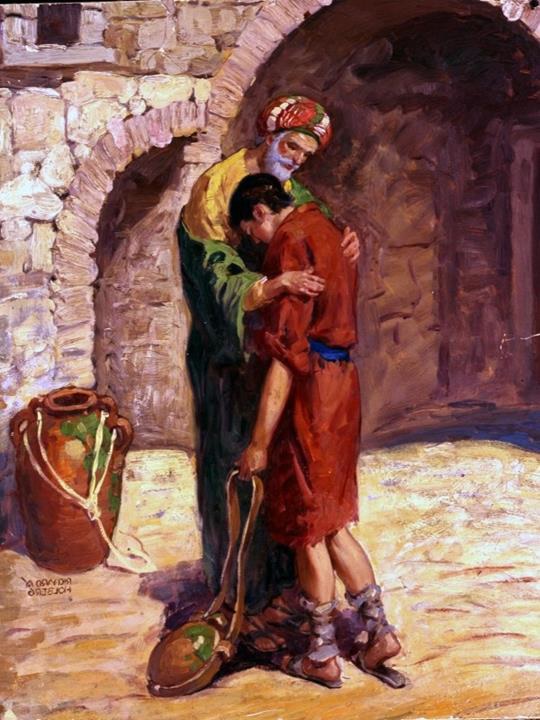
Paul’s Epistle to Philemon is considered by most biblical scholars as one of Paul’s indisputable writings. It is quite singular in its theme, and has been studied by Christian writers and apologists since patristic times.
The letter is written by Paul in prison and is addressed to Philemon, a wealthy Christian of Colossae who had a church in his home (he might have been a bishop, according to some commentators) and to two other persons connected to this household.
The main theme of the letter has to do with Onesimus, a name that means useful. Paul is sending this letter to Philemon with Onesimus, who--according to several interpreters, taking into account the content of the letter--was a former slave of Philemon’s who had escaped, and probably stolen some money from him.
Onesimus had come into contact with Paul in prison and had been converted to Christianity, becoming a faithful servant of Christ and a good helper to Paul in his mission of spreading the Good News of Salvation.
Now Paul sends Onesimus back to his owner, and he pleads to Philemon that he considers him a brother in the faith, and not a slave any longer. Paul even offers to pay Philemon any money that Onesimus might have taken from him.
At that time, slavery was an intrinsic part of the fabric of society, and slaves were considered and treated as subhuman creatures. They were regarded as private property, and the punishment for escaping could be merciless, including death.
By sending Onesimus back to Philemon, Paul is trusting that Philemon’s conviction as a follower of Christ has given him a totally different perspective in relation to the intrinsic dignity of every human being, including slaves.
Before escaping, Onesimus may have carried out several domestic tasks for Philemon; however, using an interesting play of words Paul declares to him that “formerly he was useless to you, but now he is indeed useful both to you and me.”
This obviously refers to Onesimus’s value as an agent of Christ’s Way of Love, as a new convert to the faith.
The letter deals with forgiveness and reconciliation, and appeals to Philemon’s Christian love in understanding how Paul may have simply kept Onesimus for himself, but instead of doing so, he decides to let Philemon take a step toward true forgiveness, and receive his former slave as a true brother and collaborator in the building up of God’s Reign.
Paul actually hints in the letter that he would like to keep Onesimus with him as his collaborator, but he insists on putting the decision in Philemon’s hands.
As the person through whom Philemon received the Christian faith, Paul could have used his authority to simply command that he does what he is asking, but Paul prefers to ask him in the name of Christ, whose love they now share even with Onesimus as brothers in the faith.
Paul’s last words in the letter clearly express what a deep satisfaction he derives from the certitude that Christ’s love in Philemon will not disappoint him in his expectations. He ends by saying to him, “Yes, brother, let me have this benefit from you in the Lord! Refresh my heart in Christ.”
When Christ’s unconditional love for all can work reconciliation and forgiveness in our hearts; when guided by His love we come to the realization of how equally dignified and beloved we all are in His eyes, then our hearts are truly refreshed in the living waters of His unending love, and we become preciously useful for His reign.
Fr. Carlos Expósito, Rector
|
RETURN TO TOP
The Same Yesterday, Today, and Forever
This Sunday and Beyond - August 28, 2022
Get it in PDF form with calendar
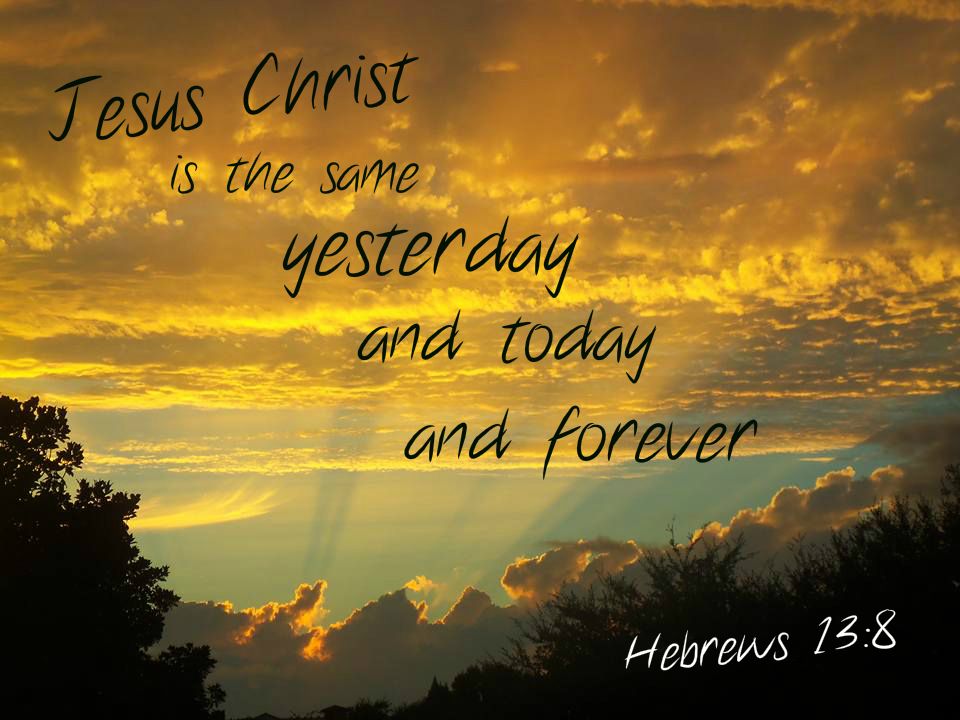
Hebrews 13:8 has one of the most quoted phrases in Christian circles: “Jesus Christ is the same yesterday, today, and forever.”
The first thing that comes to our mind when we hear or read this phrase is the idea of immutability. Jesus Christ is God. He is the Second Person of the Trinity; therefore, He is as immutable as the Divinity is. His love never changes. It remains forever.
This is reassuring enough for all of us His followers. Knowing that we can count on His love today, and always, just as His first followers did, is wonderful.
There may be other aspects to consider in this phrase though.
It is also a reminder of the timeless validity of Christ’s teachings. Jesus’ radical Way of Love, which He taught both with His words and His deeds throughout His life on Earth, is not dependent on time, location, or circumstances.
We may have to adapt the way in which we practice this unconditional love to the specific situation we live in, but the principle remains invariable: the Christian Way of living is based on the selfless sharing of our talents and goods with the others, particularly with those who suffer the most
The writer of Hebrews asks us to have compassion for the needy, the prisoner, the ill-treated, always remembering that we are as vulnerable as every human being. Compassion is a word that implies a deep empathy that makes us put ourselves in the other person’s shoes, and not look down on them from above, as the word pity may suggest.
The writer also reminds us that faithfulness in our life-long love relationship, and purity of heart and mind are intrinsic virtues in those who follow Jesus’ Way.
He then reminds his readers that love of money, or greed, can only lead us astray from this Way of Love. We need to put our full trust and confidence in our Creator and know that He will provide for our essential needs. We should also trust that nothing or no one can be against us when we faithfully follow His Way.
Last, but certainly not least, the writer of Hebrews appeals to our good judgment in imitating the life of those who, being leaders in Christ’s Way, have shown in their own lives the good fruits of their faith.
It is also in this sense that the phrase that heads this article can be read. There is a continuation of Jesus’ Way of Love in His followers of every generation that will not cease with time. It is as if His presence were actualized in each of His true followers in every place, and at every moment.
“Let brotherly love continue”, says the writer at the beginning of this chapter. And he thus expresses the idea of the ceaseless flow of Christ’s love that moves from Jesus Himself through all of His followers in every place and time.
Yes, we are called to be the grace channels through which Christ is the same yesterday, today, and forever.
Fr. Carlos Expósito, Rector
|
RETURN TO TOP
Be Still and Know That I Am God
This Sunday and Beyond - August 21, 2022
Get it in PDF form with calendar

Verse 11 in Psalm 46 has this line at the beginning of the verse, and this has lately been widely used in contemplative prayer practices as one of the main lines from scriptures to lead people to the practice of Centering Prayer.
There is nothing wrong with using this line as a powerful lead to centering oneself in God’s sole presence; however, it is never a good idea to decontextualize a line or verse from the whole corpus from which it is taken.
Psalm 46, which is the Psalm appointed for this Sunday in the Lectionary, is, above all, a psalm that gives us a deep sense of total trust in God’s help. It begins with the words, “God is our refuge and strength, a very present help in trouble.”
Then it keeps on giving images that assure us that no matter how troublesome and dangerous the times may be, the Lord of hosts, the God of Jacob, who has done awesome things on earth, is with us, and is our stronghold.
One of the most beautiful images within this psalm is the one on verse 10, “It is He who makes war to cease in all the world; He breaks the bow, and shatters the spear, and burns the shields with fire.”
This is a powerful image of God as peacemaker. Even though in the Old Testament God is often portrayed as the Lord of hosts, and this image appears in this very same psalm (verse 8), now the psalmist turns the image around and affirms that God Himself will make all wars cease, and all weapons will be consequently destroyed.
The command to be still is, above all, a reassuring command. It is like saying, “there is no need to fuss and fret, put your whole trust in me and you can simply be quiet, if you acknowledge that I rule, and nothing or no one can oppose my rule.”
This psalm is a powerful tool for any person or group of persons undergoing hard times. It is a strong reminder that in God’s presence there is no room for fear, not because trouble and hardships will suddenly cease, but because God’s unconditional love will fill us with the power to be reassured even in the very presence of death.
It is not our own clever preventive plans and devices that will eventually save us in times of trouble, but God’s powerful help.
As verse 7 puts it, “The nations make much ado, and the kingdoms are shaken; God has spoken, and the earth shall melt away.”
Here we can clearly grasp the futility of human plans that do not take God’s will into account.
The command to be still by no means implies a quietist attitude or a call to do nothing but wait. What it does mean is that our ultimate trust and the greatest help in our troubles comes solely from our Maker, who, as the last verse reiterates, “is with us”, and “is our stronghold.”
Fr. Carlos Expósito, Rector
|
RETURN TO TOP
Like Fire and a Heavy Hammer
This Sunday and Beyond - August 14, 2022
Get it in PDF form with calendar

In this week’s reading selections, we have this excerpt from the Book of the Prophet Jeremiah in which God’s Word is compared to “fire, and a hammer that breaks a stone in pieces.”
We do not normally like to read and hear such comparisons and would rather have images of God’s Word that soothe us and take us to blissful states of mind, like those meditation tapes that used to be in fashion some decades ago (and still are, using more contemporary media though).
But the Bible does have these and other extremely harsh images of God’s Word. The writer of Hebrews refers to God’s Word as “sharper than a double-edged sword”, for instance.
Jeremiah was an extremely unpopular prophet in his time. It was a time when the kingdom of Judea was facing the threat of being conquered by the Babylonians, and the king and the false prophets who surrounded him would rather speak and hear false hopes and attempt foreign alliances to prevent this from happening.
Jeremiah, on the contrary, would only speak the truth of the inevitability of them being subjected to the Babylonians, and proclaimed this was a result of all the injustice and unfaithfulness of the rulers and those who followed them, including these false prophets.
The main target of Jeremiah’s harsh criticism is these prophets “who prophesy lies in God’s name saying ‘I have dreamed, I have dreamed.’”
These are the ones who say what they know the king and his followers want to hear. They do not speak in God’s name, because God is Truth--even when this truth is the hardest to hear and face—but in their own names, pretending that their illusions are inspired by God.
Their words may have deceived many because it is the hardest thing for a nation to accept that it would be conquered and subjected to a foreign power, and Jeremiah had to suffer humiliation, incarceration and threats for remaining faithful to God’s Word.
But history proved that Jeremiah was a true prophet of God, speaking His truth no matter how hard it was, and putting up with the opposition and misunderstanding with relentless integrity and patience.
The world we are living in is full of injustice, and lack of compassion and true love. There are armed conflicts going on, caused by selfish ambitions and the illusion of power. Our planet is being disrupted by the irresponsible exploitation of natural resources that causes pollution, increases the likelihood of diseases, and the imbalance of the climate of the Earth.
Even so, we are still hoping to hear words of comfort, words that reassure us and make us believe that there is nothing really wrong with the way we are living, and that God’s favor is with us.
But these words are like straw compared to wheat. They do not nourish our souls. They do not help us make the needed change in our lives.
We need the Word that is “like fire, and like a hammer that breaks a rock to pieces”, as Jeremiah said. God’s living Word is powerful indeed, and when it is authentic and we take it into the inner recesses of our souls, it inevitably moves us to change ourselves and the world that surrounds us into what God wills it to be.
Fr. Carlos Expósito, Rector
|
RETURN TO TOP
A City Founded on Faith
This Sunday and Beyond - August 7, 2022
Get it in PDF form with calendar
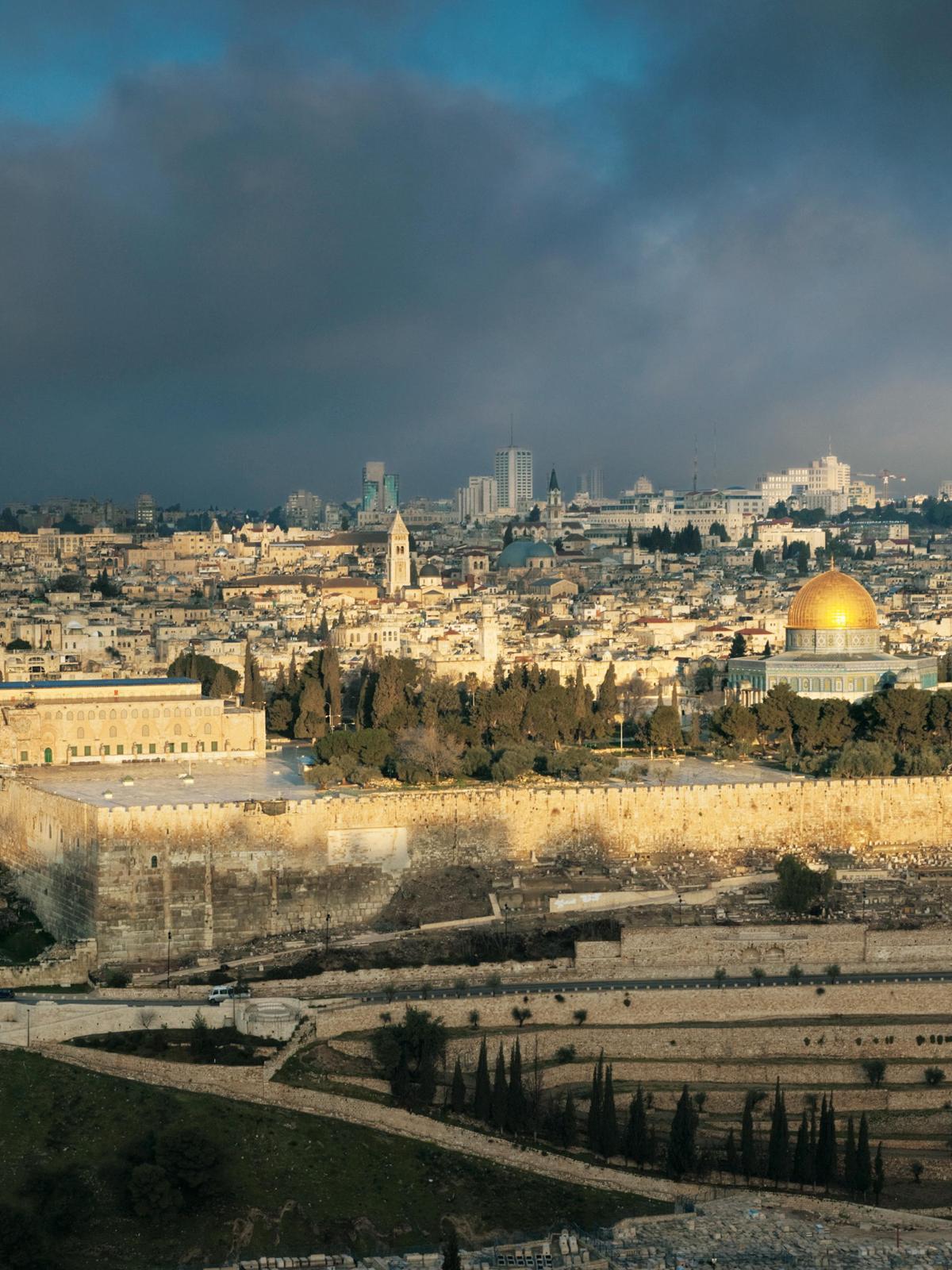
Chapter 11 of the Letter to the Hebrews brings us the topic of faith, which is the main theme of what being a follower of Jesus actually means.
Contrary to what many modern writers and movie scripters would like to make us believe, true faith is not about “a blind leap into the unknown” or a stubborn trust in some entity, whether human or supernatural.
This is the way the writer of Hebrews describes true faith: “the assurance of things hoped for, the conviction of things not seen.”
Notice the use of the words assurance and conviction to depict our faith in God. Immediately after this, the writer also uses the term understand, when affirming that “by faith we understand that the world was created by the word of God, so that what is seen was made out of things which do not appear.”
In other words, faith is not necessarily opposed to our reasoning or our common sense. It does require that we trust our Creator though, that we believe in His very being (I have never liked the word existence to refer to God, but rather to all that God has created. I would rather say that God IS.), and in His loving care of us.
To make his point clearer, the writer of Hebrews gives examples of faithful men of the past and their righteousness towards God and their fellow human beings. Among those mentioned we have Abel, Enoch, Noah, and finally Abraham. He also points out how they all trusted in God’s promises, even though they did not see the promise fulfilled in their lifetime (except in the case of Enoch, who was taken up by God Himself.)
What all these characters have in common, according to the writer of Hebrews, is that through faith they were able to please God, and fulfill the mission that God had assigned them, whose real fruits in many cases was only visible many generations later, as in the case of Abraham.
None of these great men of the past based their faith on the false hope that God would spare them from harsh times or even death (Enoch did not foresee that God would spare him from death). In most cases, being faithful to God for them meant doing things that others would consider illogical or unlikely.
When Noah started building the ark, the rest of the people laughed at him and did not believe there would be a devastating flood.
When Abraham started his journey towards the unknown land that God told him to go to, he was quietly leading a good life in Ur.
But these people did not base their faith on a senseless blind trust. They had the inner conviction and assurance that God was real and understood that His word was to be trusted.
They also understood what their role was. They saw themselves as strangers and exiles on the earth. Their aim was not to return to the place they had come from, but to seek a homeland, a better country, “a heavenly one”, as the writer of Hebrews puts it.
And God has prepared for them, as for us who follow Him in trust, a city founded on faith.
Fr. Carlos Expósito, Rector
|
RETURN TO TOP
Putting on Christ
This Sunday and Beyond - July 31, 2022
Get it in PDF form with calendar

Continuing with Paul’s letter to the Colossians, in chapter 3 we have this rich image of putting on garments, which seems to be a favorite with Paul, as we see in Ephesians 6, when he tells the converts at Ephesus to put on the full armor of God.
He admonishes Jesus’ followers at Colossae to put on the traits that will unequivocally distinguish them as true followers of Christ: compassion, kindness, lowliness, meekness, forbearance, forgiveness, but above all, love.
When referring to Christ’s love, Paul defines it as the love that “binds everything together in perfect harmony.”
So, as imitators of Christ, we the present followers of Jesus’ Way of Love, just as the converts at Colossae to whom Paul’s letter was addressed, must ask the Holy Spirit to give us the perseverance and strength to embody His boundless unconditional love as the rule of our everyday lives, letting Christ’s peace rule in our hearts.
This naturally entails mutual forgiveness, and being thankful to God for Christ’s self-giving sacrifice for our redemption at all times.
At the same time, this demands that our daily habits and routines change and be guided by the Spirit of Truth in the persistent and dedicated study of the word of Christ, letting His word not only enter our minds, but making it dwell deeply in our hearts and rule our lives.
To this end, a life lived in a supportive community of faith is essential, so that we can “teach and admonish one another in all true wisdom”, as Paul suggests, and also encourage one another with the singing of “psalms, hymns, and spiritual songs, always with thankfulness in our hearts to God.”
In this section of the letter to the Colossians Paul ends by recommending that “whatever they do, in word or deed, they should do everything in the name of the Lord Jesus, giving thanks to God the Father through Him.”
We may get so involved in useful social work, or in justice campaigns, aiming to serve our neighbor in as many ways as possible, that we forget the very reason why we are doing this loving service.
It is only out of love coming from Christ Himself that we are better empowered by the Holy Spirit to speak for justice and love, and to do works of loving service for those in need.
We cannot share what we lack. If we are not first filled with Christ’s unconditional love in our own lives, we will not be able to fruitfully share this love with others.
This is the reason why Paul insists so much in Christ’s love as the primary garment we need to put on. This is the garment that will “bind everything together in perfect harmony.”
Christ’s love is then the starting point of everything we try to accomplish in His name, with thankfulness in our hearts and His true wisdom in our minds.
Fr. Carlos Expósito, Rector
|
RETURN TO TOP
Abounding in Thanksgiving
This Sunday and Beyond - July 24, 2022
Get it in PDF form with calendar

The lectionary for these last Sundays has been bringing us vital passages from the Letter of Paul to the Colossians.
The Letter to the Colossians is a document full of sound and healthy doctrine, as valid at the time it was written as it is today, and we had better read it attentively and heed its inspiring message to a Tee.
In the second chapter of this letter, verses 6 to 15, Paul continues to instruct the converts at Colossae about the need to be continually rooted and built up in the faith they had received, but here he adds an important element: the need and fairness to abound in thanksgiving for the wonderful graces Jesus’ authentic followers have received.
At the same time, Paul warns these new converts about the multiple dangers they will be constantly facing in the pagan society where they live. He knows about the different existing philosophies, based on tradition, which may sound particularly attractive to learned people, and also about the more popular practices that make use of elemental forces and spirits, in divination and in trying to change people’s fates to accommodate them to their whims.
All this may easily deceive even those who have already been baptized in the faith of Christ Jesus the Lord, and lead them totally astray, which will evidently please the forces of evil.
Here Paul makes several deep and clear doctrinal statements which even we, 21st-century followers of Christ, had better carefully consider and follow.
“In Christ the whole fullness of deity dwells bodily, as you have come to fullness in Him, who is the head of every ruler and authority.” In other words, Christ Himself is God incarnate, and as we incarnate Him in our own lives, we also partake of His fullness of life, which no other material or spiritual ruler or authority can overcome.
This alone should be the greatest reason to be overwhelmingly thankful to our Lord every single moment of our lives. But there is more to be thankful for.
When taking part in our baptism, as Paul points out, we are “buried with Him in baptism”, and also “raised with Him through faith in the power of God, who raised Him from the dead.” This stresses the fact that we die to sin and are reborn with Christ to a wholly new resurrected and powerful life.
And last, but certainly not least, Paul makes reference to the former life of those who were recently converted, the sinful and senseless life, which is really death to God, in which even some of us, already baptized, may find ourselves when we fall back into the old life, led astray by the many deceits of this world.
In relation to this, Paul points out that God, even though they were dead in their trespasses, made them alive together with Christ, when He “forgave us all our trespasses, erasing the record that stood against us with its legal demands.”
So it is out of sheer grace, and not by any merits of ours, that we have been forgiven and given the wonderful new start that allows us to share in Christ’s glorious resurrected life.
Paul says that Jesus “set this--the legal demand--aside, nailing it to the cross, and disarmed the rulers and authorities and made a public example to them, triumphing over them in it.”
Through His wonderful self-sacrifice on the cross, the unbeatable power of unconditional love acting through Jesus overcame all the worldly and otherworldly powers that oppose God’s love, including death itself, and triumphed over it.
If we stay rooted and built up in Him, established in the faith, and abounding in thanksgiving, as Paul admonishes the new converts in Colossae, then we can also come out triumphant and share in Christ’s abundant, glorious, and resurrected life.
Fr. Carlos Expósito, Rector
|
RETURN TO TOP
The Mystery Revealed to God’s Saints
This Sunday and Beyond - July 17, 2022
Get it in PDF form with calendar
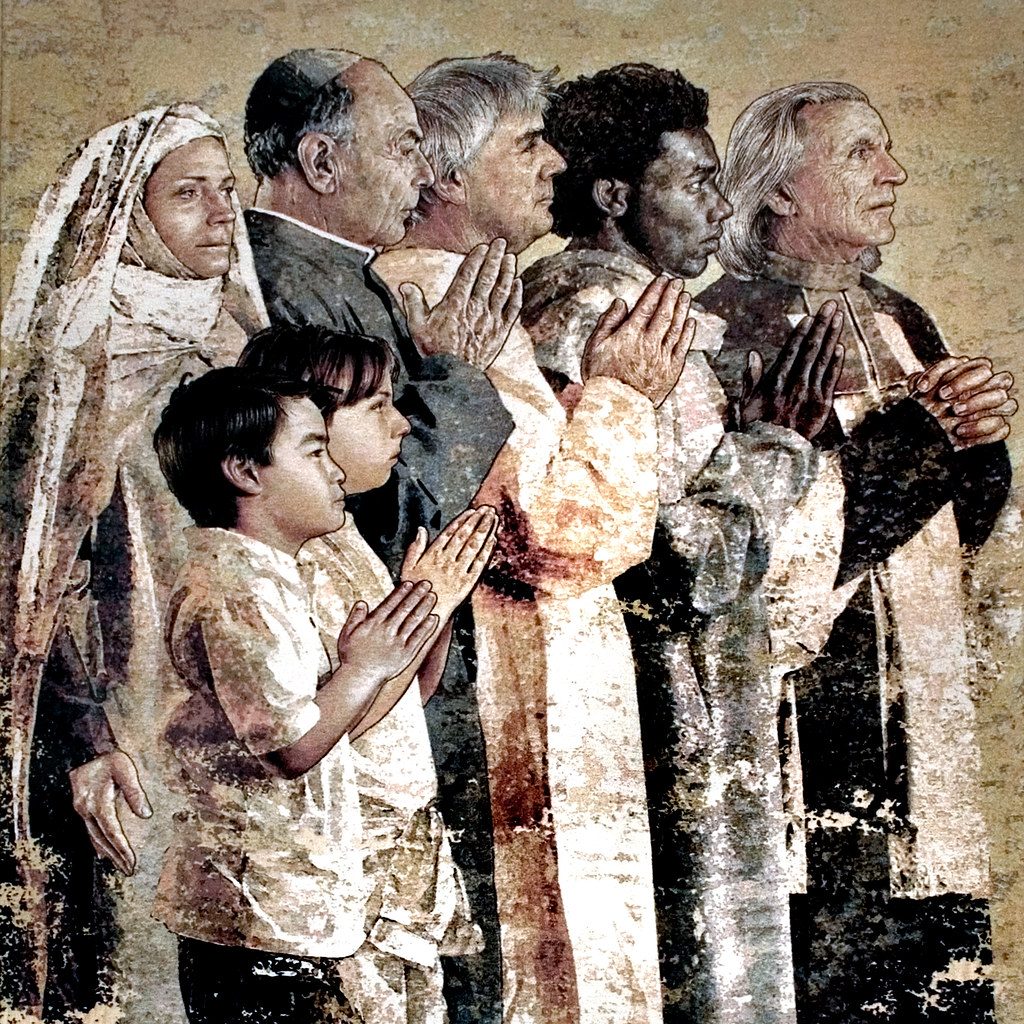
In his letter to the Colossians, the Apostle Paul reminds the new converts to Jesus’ Way of Love in that city of their condition prior to Christ’s reconciling work carried out through His self-giving sacrifice: they were estranged and hostile in mind, doing evil deeds.
In stark contrast, they are now being presented holy and blameless before Christ--on condition that they remain faithful and steadfast in the faith they have received, and without shifting from the hope promised in the Good News they have heard.
Paul’s intention is certainly not to make them feel ashamed of their past pagan way of thinking and living, but to highlight the wondrous nature of the new life they have been offered, and to stress the relevance of following this new way steadily and also maturing in it, so as to be partakers of the promised glory that has been revealed.
Paul uses the term mystery to refer to this revelation granted to the followers of Jesus’ Way. A mystery is, by definition, something not understood or beyond understanding.
What Paul wants to emphasize here is that the Word of God had only been partially revealed through prophets and sages in ages past, but is now fully revealed as the Word incarnate, Jesus Christ Himself.
In Jesus Christ, who is God’s Word living with God’s people, and reveals to each of us our true nature in God as His sons and daughters, the veil that covers our hearts and minds and keeps us separated from His river of life when we shut ourselves off to the flow of His unconditional love through us, is totally lifted if we choose to follow His Way of Love.
Partaking in His abundant life-giving love is the greatest of blessings for all creatures under heaven, and this is the Good News that Paul felt he was compelled to proclaim.
The mystery revealed to His saints, to the ones who devote their lives to follow His Way faithfully, and grow in its knowledge and practice until maturity is reached, is not an enigma to be deciphered by the use of secret codes or strenuous intellectual scrutiny and effort, but is gracefully and freely offered to all those who willingly partake in His Way.
As servants of God and Christ, inspired by the Holy Spirit, each of His followers has been commissioned, just as Paul has, to proclaim to all “the riches of the glory of this mystery, which is Christ in us, the hope of glory.”
It is thus imperative that as Christ’s followers, just as Paul did, we diligently engage in “warning everyone and teaching everyone in all wisdom”, so that just as he said to the Colossians, each of us can also affirm, “for this I toil and struggle with all the energy that He powerfully inspires in me.”
Fr. Carlos Expósito, Rector
|
RETURN TO TOP
The Word Is Very Near to You
This Sunday and Beyond - July 10, 2022
Get it in PDF form with calendar

In the first book of the Bible, known as Genesis, it is said that it is through His Word that the Creator of all that is has brought everything into existence, including us human beings. It is God’s Word which conveys His creative will and power and makes possible that His will be translated into existence.
It is also God’s Word inspired by His Spirit that has spoken to His people through the prophets, and has been transmitted from generation to generation, in spoken form first, and later in writing, so as to guide us into all truth and enable us to live in fullness of love and harmony with one another and with the rest of creation.
As Moses said to the people, according to the Book of Deuteronomy, God’s commandment given to His people is not an alien law, unrelated to people’s everyday lives, or contrary to natural laws, that people need to find in inaccessible places or make an extraordinary effort to put into practice.
On the contrary, the commandment that our Creator has transmitted to us through His prophets, is simply the law of love. Love is at the very essence of nature and all creation. It was out of love that God made all that is, and made us in His very likeness and image that we might be partakers of His loving joy at sharing it with our human fellow beings, and the rest of the living beings on this Earth.
In the written law inspired by the Holy Spirit, God’s commandments may be summarized in two: to love our Creator with our whole being, and to love our neighbors as we love ourselves. If we follow this law of love we will share in God’s joy for all His creatures, and will be partakers of His love.
Going back to the first book of the Bible, in the depiction of the Garden of Eden, we find that God’s intention is for human beings to enjoy a close communion of love with Him, with one another, and with the rest of creation. But God did not create us humans as automatons who follow a pre-determined built-in program, but as free beings, with the capacity to make choices—even the wrong ones, and also learn from our mistakes.
One of the choices we make is whom to love. Throughout history, humans have tended to associate with others with similar interests and characteristics, considering them their “neighbors”, while rejecting those who they see as alien, or even enemies. This does not reflect God’s universal and unconditional love, but a limited kind of self-centered love who conveniently includes only those who can benefit our selfish interests in some way.
This is clearly reflected in the dialogue between Jesus and the lawyer In Luke 10:25-37. The lawyer can accurately determine the commandments he must follow to inherit eternal life—the law of love—but fails to understand that when the commandment says “your neighbor” it is not about each of us determining who our neighbor is, but that we are to become the “neighbor” of all those we come in contact with, and show compassion and love to all, regardless of any labels society may have put on them.
This is the essence of the Parable of the Good Samaritan.
To the ears that heard Jesus tell it, it must have sounded highly offensive that a Samaritan—the enemy—as opposed to the priest and the Levite, was the one who had compassion for the wounded man. But Jesus did it on purpose to show that real love has no labels.
Jesus Himself is God’s Word incarnate and never before has God’s Word been nearer to us than after Jesus Christ became flesh to live among us. Through the power of the Holy Spirit, God’s Word now also inhabits each of us if only we open our hearts to Him.
As Moses clearly implied, there is no excuse for not following God’s Word; it is so very near to us.
Fr. Carlos Expósito, Rector
|
RETURN TO TOP
Bearing the Marks of Jesus
This Sunday and Beyond - July 3, 2022
Get it in PDF form with calendar
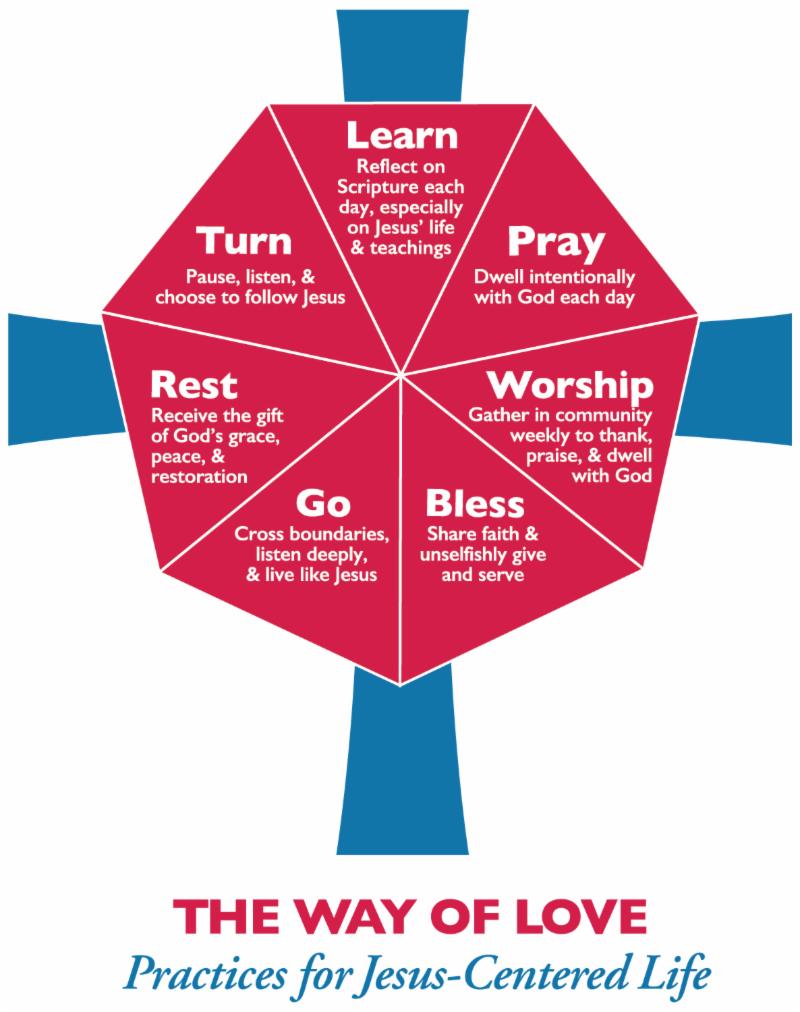
This Sunday’s readings bring us another section of Paul’s letter to the Galatians (6:1-10, 14-18). In this part the Apostle’s main intention is to insist on the way Jesus’ followers should deal with one another in true gentleness and mutual love and respect, kindly restoring those who trespass, and bearing one another’s burdens in the community, but also having each person take responsibility for their own work.
He also warns against any kind of boasting, for the only thing Christ’s followers may glory in should be the cross of our Lord Jesus Christ, and this is the only boasting Paul allows himself to indulge in.
When talking about Jesus’ cross, Paul asserts that the world has been crucified to him and he to the world in Jesus’ cross. The Apostle’s focus is now solely God’s reconciling mission handed down to him by Jesus Himself during the encounter on the road to Damascus.
This zeal that Paul shows in spreading out the good news of salvation as far and wide as he possibly can, showing the transforming power of Jesus’ Way not only in his message but in the example of his own life, is essentially what Paul means when he claims that he has been “crucified to the world, and the world to him.”
What seduces and attracts most people no longer means anything to Paul. By centering on Christ and His salvific mission, every other attachment has lost any power over him, and not even circumcision--the outer mark of belonging to the chosen people--has any value to him anymore.
As he himself points out, it is “a new creation” that really counts. Being created anew in Christ by the Holy Spirit means being so transformed that our old attachments, old concepts and prejudices, and old allegiances all lose their value and place in our lives as long as they no longer reflect Jesus’ radical Way of Love.
But it also means that our faithfulness in following Jesus can and will often bring about trouble to our lives. There will be those who despise us, try to discredit us, or even hate us. We may even suffer violence for standing firm in our faith and living out Christ’s radical Way of Love.
Paul’s firm conviction in Jesus’ Way brought him all sorts of clashes with the religious and civil authorities. He was scourged and imprisoned, and during some of his travels he was shipwrecked too. When he said, “for I bear on my body the marks of Jesus” he was literally talking about painful physical marks.
His commitment to Jesus’ Way was no joke. He had no easy life in a comfortable place. He was totally driven by the zeal of the mission Jesus had entrusted him, and he carried it out relentlessly.
Paul, Peter, and the rest of the disciples all bore the marks of Jesus consistently in their lives. So did most of those who followed them. They are the true marks of unconditional love that we, the present-day disciples, are also called to bear.
Fr. Carlos Expósito, Rector
|
RETURN TO TOP
The "Flesh" the Holy Spirit Opposes
This Sunday and Beyond - June 26, 2022
Get it in PDF form with calendar

In Chapter 5, verses 1 and 13-23, of his letter to the Galatians, the Apostle Paul exhorts these new converts to live by the Spirit, as a mark of having been set free by Christ, as opposed to the old life ruled by the flesh.
In this letter Paul insists that his readers should not “gratify the desires of the flesh, for what the flesh desires is opposed to the Spirit, and what the Spirit desires is opposed to the flesh, for these are opposed to each other, to prevent you from doing what you want.”
This Pauline dichotomy has been understood by many as a warning for all Christians to reject all that is associated to our bodily parts if we want to become more spiritual, more Christ-like.
According to this view, attending to our basic physical needs, like eating, drinking, and the need to be clothed and find shelter can only be excused as bodily necessities that we cannot do without. On the other hand, our sexual drive can only be excused as leading to procreation, and indulging in pleasure when performing the act is out of the question.
Notions like these encouraged many pious people throughout the centuries to lead a life of bodily mortification, where no self-gratifying pleasures could be indulged in.
But a life of self-mortification does not necessarily make us better followers of Christ. It may even turn us into self-righteous people, which is the most dangerous form of sin, because it often disguises itself in virtue, when it is actually a selfish expression of spiritual pride.
In fact, these notions may be quite far from the Apostle’s primary intention, and may turn out to be misleading in the end.
It is true that Paul uses the word flesh, which actually means the bodily parts of our being. But a word may be used with different meanings in different contexts.
Paul used several pairs of contrasting terms to convey his ideas: the law as opposed to Christ, or the faith; the flesh as opposed to the Spirit; this age as opposed to the new age. These contrasts served to give greater force to the faith truths he was trying to expose and convey.
In relation to his notion of the bodily part of our being, which he usually refers to as the body, we notice that he insists that our bodies are temples of the Holy Spirit, and when he refers to our resurrection, he insists that we will be given a new, incorruptible body (but a body nonetheless).
So the body as such did not have a negative connotation for Paul. It is what he calls the flesh that he places in opposition to the Spirit.
To have a better understanding of what Paul refers to by this term, it is useful to read the paragraph that precedes this dichotomy, and also the paragraphs that follow.
In the preceding paragraph, when talking about the freedom Christ has given us, he warns that we should not use it “as an opportunity for self-indulgence, but through love become slaves to one another. For the whole law is summed up in a single commandment, ‘You shall love your neighbor as yourself’.”
Here we can clearly see what the primordial opposition is for Paul: a self-centered, selfish life versus a branched-out life--a life oriented towards the other--as a reflection of Christ’s Way of Love.
When Paul mentions the obvious works of the flesh in a subsequent part of the text: fornication, impurity, licentiousness, idolatry, sorcery, enmities, strife, jealousy, anger, quarrels, dissensions, factions, envy, drunkenness, and carousing, we can clearly see that none of these would be the result of attending to the body’s natural and healthy needs and desires, but the consequence of a selfish, twisted, and unnatural way of pleasing our self-centered whims, without considering the others’ rights and dignity.
Paul finishes this exhortation by mentioning the obvious fruits of the Spirit that, as followers of Christ, we should live by: love, joy, peace, patience, kindness, generosity, fruitfulness, gentleness, and self-control.
Just as the Apostle states, then, “if we live by the Spirit, let us also be guided by the Spirit.”
Fr. Carlos Expósito, Rector
|
RETURN TO TOP
The Freedom That Faith Confers
This Sunday and Beyond - June 19, 2022
Get it in PDF form with calendar

Many a times we hear people (especially the younger generation) say that they consider themselves to be spiritual people, but are not affiliated to any specific Christian denomination simply because they are free thinkers, and do not want to see their freedom constrained.
Every person is free to have an opinion on this view, and it is not my intention to be contentious here. However, there might be some misunderstanding as to what real freedom implies.
From a Christian viewpoint, at least, there can be no real freedom that does not place the love of God, and the love of others, at the very center of our lives.
Real freedom has nothing to do with being whimsical and pleasing yourself all the time, with no regard to the good of others.
What real freedom does is to cast all fear away. What keeps us tied to our belongings, to our emotional attachments, our insatiable want for more, and all other addictions, is essentially fear.
We fear to lose what we imagine that makes us happy, and these fears can sometimes even lead us to compete fiercely with our fellow human beings, causing hatred that may end up in violent conflicts, including wars.
From the early stages of civilization, it became evident that for society to be preserved, restrictive rules had to be put in place that would make people behave in socially acceptable ways.
The Jewish society was no exception, and their precepts, based on their worship of the One God, guided them to behave in such a way that showed the virtues of mercy, compassion, and justice, among themselves, and also towards strangers and foreigners.
But as Paul says in his letter to the Galatians, “the law was our disciplinarian until Christ came. But now that faith has come, we are no longer subject to a disciplinarian, for in Christ Jesus you are all children of God though faith.”
In other words, faith in Jesus Christ can make us free of the dependence on restrictive laws to relate to God and to our fellow human beings. What this faith confers to us is a totally new way to relate to our Creator and to others.
When we have a true and deep encounter with Jesus Christ by His Holy Spirit, working in whatever ways He chooses to touch us, whether it is through scripture, someone’s preaching, a person sharing their faith story with us, or through the wonder of nature itself, this transforms our lives by making us aware of God’s infinite love for us, which triggers a loving response in us, directed towards our Creator, our fellow human beings, and all creatures.
As John the Evangelist puts it in his first letter, “There is no fear in love, but perfect love drives out fear, because fear has to do with punishment. The one who fears is not perfect in love.”
Real freedom, is, above all, being totally rid of all the fears in your life.
One thing we Christians get to experience, when our faith is mature enough, is that the fears we used to have, based on our attachments, start to fade away as our love of God and of our fellow human beings increases, and we then begin to experience an exhilarating freedom that we cannot help but share with the rest.
This will not prevent us from facing harsh situations or even excruciating pain, but it will confer to us the freedom that Jesus Christ’s Way of Love gives.
True faith in Christ confers the true freedom: the freedom to love as God loves.
Fr. Carlos Expósito, Rector
|
RETURN TO TOP
Cleansed and Empowered for His Mission by the One God
This Sunday and Beyond - June 12, 2022
Get it in PDF form with calendar

Trinity Sunday, the Sunday in which the church universal reaffirms its faith in the One Triune and Almighty God, brings us in Year C a reading from the Book of the Prophet Isaiah in Chapter 6, verses 1-8.
This reading tells us about one of Isaiah’s visions of the Godhead, the Almighty God. It is a vision of God’s heavenly throne in which seraphs, the highest beings in the angelic hierarchy, are seen attending the Supreme Lord.
The description Isaiah gives of these heavenly beings is not detailed or exhaustive, but he mentions they have three pairs of wings, and that they call to one another saying:
“Holy, holy, holy is the Lord of hosts;
The whole earth is full of His glory.”
Without any attempts to imply that there is some kind of distinct Trinitarian overtones here, it is interesting to notice the presence of the triads, both in the pairs of wings in the Seraphs and in the triple use of the word holy to refer to the Almighty God.
The prophet is filled with awe before these beings and the very presence of God, which makes the whole place shake and smoke, as signs of the power of the Almighty.
Isaiah considers himself unworthy of being in the divine presence, and fears for his life, because in the conception of the Old Testament, no ordinary sinful mortal could see God’s face and live.
He describes his condition and that of the people he belongs to as of “unclean lips”. We here notice that the prophet’s main concern is what he and his people declare with their mouths.
It would be rather superficial to think that he was thinking about the use or non-use of curse words. What distinguishes true prophets from false ones is not whether they use educated or coarse vocabulary, but if their words (and corresponding actions, if they are to be consistent with what they speak) correspond to God’s will or not.
At this point Isaiah recognizes that he and his people do not always speak and act according to God’s unconditional love. He acknowledges the fact that his words and actions and those of his people do not often reflect compassion, justice, and truth; on the contrary, they often tend to be selfish, corrupt, and cruel; devoid of mercy and love.
His close encounter with the divine realm and its pure majestic glory, full of truth, justice and love, makes the prophet recognize his deep inadequacy before Him that is all Truth, and this triggers repentance in the depths of his soul.
This is not overlooked by the angelic beings, who seem to have the capacity to sense what really happens in the human soul, and one of the seraphs takes a living coal from God’s altar and touches Isaiah’s lips with it.
In strictly physical terms, we know this is extremely painful. In spiritual terms, it may also be painful, in the sense that it initiates a hard purifying process that will enable the prophet to speak and act according to God’s will, no matter how well-acclaimed or rejected he may be by others.
Speaking and acting according to God’s will; in other words, carrying out His mission in the world, may be extremely hard and painful when so many others try to oppose His will.
But when you feel totally forgiven, cleansed and being born anew by God’s grace, and He asks whom He can send to fulfill His reconciling mission in the world, there is no other way to respond to God but by repeating Isaiah’s words:
“Here am I; send me!”
Fr. Carlos Expósito, Rector
|
RETURN TO TOP
Multiversity as the Essence of Oneness
This Sunday and Beyond - June 6, 2022
Get it in PDF form with calendar

It is common to think that when it comes to the idea of unity or oneness, the fewer the differences among the members of any given body, the closer they are to achieving this unity.
That can be true when differences mean deep discrepancies that lead to destructive conflicts that disrupt the unity of a group.
The story is totally different when we are dealing with the One Holy Spirit.
If we think about the powerful manifestation of the Holy Spirit that filled the disciples gathered in Jerusalem for the Feast of Pentecost, the first thing we notice in Luke’s narrative is how the One Spirit shows Himself, not as one large dome of fire above all the disciples, but as divided tongues of fire over each of their heads.
Luke says nothing about the individual tongues of fire, but I have always had the idea that they must have looked discretely distinct, maybe with different hues of the same color.
What gives me this idea is what Luke himself says later on in the narrative, about how the multicultural and multilingual crowd gathered there heard the disciples speak each in their own native language, as the Spirit gave each of the disciples the ability to do so.
The passage clearly speaks of differentiated gifts to each person, which makes me think of varied hues in the flames.
This first experience of the powerful manifestation of God’s and Christ’s Spirit to Jesus’ followers clearly had a purpose that included multitudes of different national and ethnic origins. And the purpose did not include obliterating their diversity.
The Spirit did not make them hear God’s deeds of power in a common language (it would have probably been Aramaic, or Greek, which most of the peoples of the nearby countries knew to a greater or lesser degree). The Spirit enabled them each to hear Christ’s wonderful news of salvation in the language or their heart, their native tongue.
In other words, the rich diversity of humankind was highly valued and honored by the Holy Spirit.
When Paul speaks of the gifts of the Holy Spirit in his First Letter to the Corinthians, he stresses the idea of one and the same Spirit, in which we are all baptized, giving to each varied gifts, as the Spirit chooses to do, for the common good.
Paul also mentions that among those receiving these varied gifts are Jews and Greeks, sla and free persons, who are all made to drink of the One Spirit.
Sometimes when we hear the narrative of the Pentecost experience we tend to think that the Holy Spirit somehow erased the linguistic and cultural differences by making the message understandable to all present. The idea that prevails in this understanding of the narrative is one of unification.
There is nothing wrong with stressing the idea of the unity of all in the Spirit through the message of God’s wonderful deeds of salvation for all the peoples, but the details of the passage that remind us how valuable and intrinsically essential the multiversity is for the Spirit’s manifestation are often overlooked.
Let us celebrate the powerful manifestation of the Holy Spirit on the Feast of Pentecost aiming at a greater unity in harmony and love among all the believers, and eventually in all humankind, but let us also celebrate the essential multiversity which makes this powerful manifestation possible.
Fr. Carlos Expósito, Rector
|
RETURN TO TOP
Filling and Lifting Us Up to Him
This Sunday and Beyond - May 29, 2022
Get it in PDF form with calendar
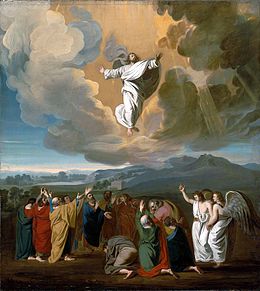
As we approach Ascension Day, there is a tradition in the western church to pray for prosperity in agriculture, fishing, commerce, and industry, including the stewardship of creation, on the three days preceding Ascension Day. These three days are known as Rogation Days. Also, the Sunday before these three days has come to be known as Rogation Sunday.
Although the observance has become optional in the Episcopal Church, we can still find some references to the proper use of the Earth’s resources and its blessings in the readings for this particular Sunday.
In the reading from the Book of Acts (Acts 14: 8-18) when Paul rebukes the Lycaonians for trying to offer sacrifice to him and Barnabas as gods after they cured a man crippled from birth, Paul reminds them that even when they had not directly received God’s revelation through Scripture and through His Son, God has always given all peoples witness of His goodness towards all human beings, by giving them rain from heaven and fruitful seasons, and filling them with food and their hearts with joy.
The reading from the Book of Revelation, on the other hand, shows a vision of the New Jerusalem, the city that represents God’s home with us.
It is interesting to notice the absence of a temple in this city. This is a good reminder to us that the church is just a temporary means to an end, and not an end in itself.
In the vision of this new state of being where God will be all in all, there is no need of separate places for worship, simply because our lives will be in complete harmony and communion with the living God, with one another, and with the whole of creation.
There are interesting images in this vision, and some of them cannot be taken too literally if we are to understand what they point to.
No need of moon, sun, or any lamp, and the total absence of night may not sound too appealing if we take it literally. Who wants constant bright day without the natural succession of light and darkness? Those who live in polar parts of the earth where there is daylight for about six months, and night for the same period do not find it particularly agreeable.
What the vision probably means is that God will so strongly illuminate our souls with His constant presence that we will never feel darkness in our lives anymore.
We human beings long for a life full of good health, harmony, justice, peace, and abundance of all necessary goods, and love among all creatures. The idea of a New Creation is appealing to all, as long as we can still recognize it as what God created in the first place and “saw that it was good indeed” as the first book of the Bible states.
Looking at some pictures of Mars the other day, I was struck by the idea of humankind having to live there one day. The sky looked colorless and it gave me a bad chill. How devastatingly desolate the place looked! That is certainly not the new Earth I would like to inhabit!
When thinking about a New Creation we should not think of an alien or unrecognizable environment. Although it is true that we have distorted much of the original good in creation and in ourselves, and it is also true that nature can sometimes cause harm to us (earthquakes, hurricanes, and plagues are a good example), creation is still essentially good and human beings have been created in the image and likeness of God’s goodness.
In times when we hear about so much hatred and inhumanity, and people killing one another in wars, it is hard to recognize this essential goodness that inhabits us all and is an essential part of all that surrounds us.
However, we do not believe in a god who made a failed creation experiment and will someday make a second attempt to remedy it, but in the God of the Bible who created all in His goodness and made us like Himself, so that we became stewards of the unceasing re-creation that --as the beautiful image of the river of the water of life, and the tree of life depicts in the Book of Revelation—will ultimately bring us all, together with the whole creation, to a greater degree of harmony, peace and wholeness, where suffering, decay, hatred, lack of love, and death will no longer have place.
Fr. Carlos Expósito, Rector
|
RETURN TO TOP
Our Home with God
This Sunday and Beyond - May 22, 2022
Get it in PDF form with calendar

As we approach Ascension Day, there is a tradition in the western church to pray for prosperity in agriculture, fishing, commerce, and industry, including the stewardship of creation, on the three days preceding Ascension Day. These three days are known as Rogation Days. Also, the Sunday before these three days has come to be known as Rogation Sunday.
Although the observance has become optional in the Episcopal Church, we can still find some references to the proper use of the Earth’s resources and its blessings in the readings for this particular Sunday.
In the reading from the Book of Acts (Acts 14: 8-18) when Paul rebukes the Lycaonians for trying to offer sacrifice to him and Barnabas as gods after they cured a man crippled from birth, Paul reminds them that even when they had not directly received God’s revelation through Scripture and through His Son, God has always given all peoples witness of His goodness towards all human beings, by giving them rain from heaven and fruitful seasons, and filling them with food and their hearts with joy.
The reading from the Book of Revelation, on the other hand, shows a vision of the New Jerusalem, the city that represents God’s home with us.
It is interesting to notice the absence of a temple in this city. This is a good reminder to us that the church is just a temporary means to an end, and not an end in itself.
In the vision of this new state of being where God will be all in all, there is no need of separate places for worship, simply because our lives will be in complete harmony and communion with the living God, with one another, and with the whole of creation.
There are interesting images in this vision, and some of them cannot be taken too literally if we are to understand what they point to.
No need of moon, sun, or any lamp, and the total absence of night may not sound too appealing if we take it literally. Who wants constant bright day without the natural succession of light and darkness? Those who live in polar parts of the earth where there is daylight for about six months, and night for the same period do not find it particularly agreeable.
What the vision probably means is that God will so strongly illuminate our souls with His constant presence that we will never feel darkness in our lives anymore.
We human beings long for a life full of good health, harmony, justice, peace, and abundance of all necessary goods, and love among all creatures. The idea of a New Creation is appealing to all, as long as we can still recognize it as what God created in the first place and “saw that it was good indeed” as the first book of the Bible states.
Looking at some pictures of Mars the other day, I was struck by the idea of humankind having to live there one day. The sky looked colorless and it gave me a bad chill. How devastatingly desolate the place looked! That is certainly not the new Earth I would like to inhabit!
When thinking about a New Creation we should not think of an alien or unrecognizable environment. Although it is true that we have distorted much of the original good in creation and in ourselves, and it is also true that nature can sometimes cause harm to us (earthquakes, hurricanes, and plagues are a good example), creation is still essentially good and human beings have been created in the image and likeness of God’s goodness.
In times when we hear about so much hatred and inhumanity, and people killing one another in wars, it is hard to recognize this essential goodness that inhabits us all and is an essential part of all that surrounds us.
However, we do not believe in a god who made a failed creation experiment and will someday make a second attempt to remedy it, but in the God of the Bible who created all in His goodness and made us like Himself, so that we became stewards of the unceasing re-creation that --as the beautiful image of the river of the water of life, and the tree of life depicts in the Book of Revelation—will ultimately bring us all, together with the whole creation, to a greater degree of harmony, peace and wholeness, where suffering, decay, hatred, lack of love, and death will no longer have place.
Fr. Carlos Expósito, Rector
|
RETURN TO TOP
The Unmistakable Mark of Discipleship
This Sunday and Beyond - May 15, 2022
Get it in PDF form with calendar

Discipleship has become one of the main goals in people’s faith journey in all churches. It is said that without becoming Christ’s real disciples we cannot grow in our faith, so after Initiation (Baptism), the next stage should be a solid formation in the basics of Christianity, which usually involves Bible knowledge, some basic Theology, attention to personal and communal devotional life and prayer, and the practice of Christian charity or love.
All this is undoubtedly relevant and it is a good idea to pay due attention to the different components that make up what is usually known as discipleship. A more mature faith normally includes this kind of formative spectrum, which can be tackled in a more or less structured manner, depending on what each church offers its parishioners.
Jesus had a particularly effective way of teaching His disciples. He first invited them to come and see where He dwelt, and then had them watch, by coming along with Him everywhere He went, how He carried out God’s reconciling mission through His radical Way of Love.
In due time, He began to give them participation in His loving deeds, while He was also present, and finally He sent them out, when He felt they were ready, in pairs, to carry out His reconciling work of caring love.
Jesus did not use a structured course on discipleship to teach His followers about the mission they were called to carry out—or perhaps He did, but the structure was all in His mind. However, no one could ever match the effectiveness of His training method. ?
The best teacher or leader is not the one who becomes indispensable, the one the disciples always stay stuck with and cannot function without, but the one who prepares his disciples properly to take on the functions of leaders and teachers themselves.
Jesus was well aware of His return to the Father, and He let the disciples know about it. Most of the time they simply ignored His warning, perhaps hoping that by taking the idea out of their minds it would never happen, but it did.
Right before He went back to the Father, He reminded His followers what the unmistakable mark of their discipleship would be: to love one another as He had loved them. He called this the new commandment, and sometimes we may wonder if that was a good name for it.
Loving others as they loved themselves was certainly not a new commandment. Jesus used this commandment in His summary of the Law, taken from two different texts from the Old Testament, one from Numbers and the other from Deuteronomy. So obviously this was not new for the disciples.
But Jesus was asking them to love one another as He had loved them, and there is quite a significant difference here.
The commandment to love one’s neighbor as oneself is usually understood in the sense of doing to others as one would have others do to one. It is a great commandment, and if it were put into practice by most people, the world would indeed be a much better place.
But loving others in the way that Jesus has loved us, which is equivalent to saying “in the way God loves us”, that is, unconditionally, limitlessly, to the point of self-oblivion and self-sacrifice, is a much higher—and obviously harder—goal to achieve.
This is what Jesus was asking His followers to show forth in their lives. This kind of radical and unconditional love for all is what makes us remember our true identity in our loving God, and constitutes the authentic mark that will identify us as true disciples of Jesus Christ, His beloved Son.
Fr. Carlos Expósito, Rector
|
RETURN TO TOP
Who Are the Good Shepherd’s Sheep?
This Sunday and Beyond - May 8, 2022
Get it in PDF form with calendar

The Fourth Sunday of Easter always brings us the theme of Jesus as the Good Shepherd, even when the Gospel readings vary from Year A to B and C, and some years the references may be more obvious than others.
The Gospel in Year C centers around Jesus’ identity as the Messiah, God’s Anointed One, the Christ, and the Jews being unclear and confused about it. They want a clear-cut statement from Jesus about Himself being the Messiah or not, although they do not seem prone to believe that He is the one.
The notion that prevailed among Orthodox Jews at the time made a close connection between the coming of the Messiah and the restoration of Israel’s kingdom to the glory it had had (more imaginary than historically factual) in David’s time. It was even expected that Israel would actually become the political and religious center of the world.
It was also connected to the notions of universal peace, justice, harmony, and the resurrection of the dead, for those who believed in it.
They had heard about the powerful signs Jesus was making in terms of healing people and bringing them back to life, as well as feeding multitudes with a scarce supply of food. But they had not heard anything about this person becoming a king and launching a liberation movement that would put an end to the Roman domination and would make Israel the greatest of nations.
Jesus replies to their inquiry by making it clear that they cannot perceive His true identity simply because they do not believe that He comes from God. The reason for this—as Jesus tells them—is that they do not belong to His sheep.
The sheep recognize their shepherd and follow him when they hear his voice. Such is the close relationship that is established between them and the shepherd. And the reason for this closeness is the tender caring love that the shepherd shows for his sheep.
God’s love is for all His creatures, and especially for us human beings. Having been created in His image and likeness we should be able to perceive God’s love for us and spread it out to the rest, but unfortunately this does not always happen.
There is something in our human nature that can make us so self-centered, so selfishly oblivious of the others’ sufferings and needs, that we become indifferent and only care about our material wealth and well-being. When that happens, we deafen our ears to the shepherd’s call and go out of the fold.
A human shepherd can bring his sheep back to the fold forcefully. He will do so because he knows that the sheep’s very lives depend on being within the fold. But God made us free to make our choices and will only bring us back through persuasive loving methods, never by force.
By sending His beloved Son to our rescue, even to the point of self-sacrifice on the cross, God has shown us His loving care in the most obvious way. What could be more lovingly persuasive?
Even so, many are still stubbornly pretending they can make it on their own, and do not want to heed the Shepherd’s voice.
But there is wonderful hope. In the Book of Revelation, John has a vision in which there is an uncountable multitude from every nation, from all tribes and peoples and languages, robed in white, with palm branches, and worshiping the Lord. It is said of them that they are the ones who have gone through the great ordeal and washed their robes and made them white in the blood of the Lamb.
When the Book of Revelation was written there was great persecution against Christ’s followers, so many of them suffered and were even martyred. There has been a multitude of Christians who have suffered in different ways for their faith throughout history. Even nowadays, in places where there is freedom of religious expression, people who are consistently Christian often suffer scorn and rejection from many.
In John’s vision these are precisely the sheep that the Lamb calls by their names.
“They will hunger no more, and thirst no more, the sun will not strike them, nor any scorching heat; and the Shepherd will guide them to springs of the water of life, and God will wipe away every tear from their eyes.”
Fr. Carlos Expósito, Rector
|
RETURN TO TOP
God Wonders Beyond Our Ken
This Sunday and Beyond - May 1, 2022
Get it in PDF form with calendar

The reading from the Book of Acts of the Apostles (The Book of Acts of the Holy Spirit, as our former Bishop of Canterbury, Rowan Williams, liked to call it) this Sunday brings us one of the accounts of St. Paul’s conversion. Two other accounts of this event appear in the same book and also in Paul’s letter to the Galatians.
One may wonder how come that a person who was totally and stubbornly convinced that those who followed Jesus’ Way were enemies of God’s true religion (Orthodox Judaism, in his view), and relentlessly persecuted and imprisoned Jesus’ followers with the purpose to wipe them off the face of the earth, ended up being the person who did more than any other Apostle to spread out Jesus’ New Way of Love throughout the known world of his time.
This is not easy to understand, especially when we have been told that God will never force anyone to believe, simply because He always respects the freedom of choice with which He endowed us.
I once asked my Theology professor at the Seminary this question, because the story of Paul’s conversion has always intrigued me. It seems to contradict the principle of free will in human beings.
What he answered did not sound particularly convincing at the time, but reflecting upon his words later, I have to admit that he may have had a point there.
What my professor hinted was that even though the story seems to depict a sudden conversion on the spot, practically forced upon him by Jesus, Paul may have been subconsciously--and maybe quite consciously, even though he did not openly admit it--ruminating that there was something particularly special about the way these followers of Jesus remained faithful even if they faced death for their cause (he had witnessed Stephen’s stoning to death and approved it).
He may have also heard stories about how these people loved one another and shared all their possessions in common, and how signs of healing and great wonders abounded among them.
All this may have had a powerful impact on Paul’s mind, and this may have prepared the way for the new thing that Jesus Himself was about to do with his life.
In the conversation with Ananias—the disciple Jesus chooses to send to Paul so that he may recover his sight and be baptized in Jesus’ Way of Love—Jesus makes it clear he was well aware of all that Paul had done against His followers, but precisely because He knows that Paul is such a relentless follower of what he is convinced of, He knew that once his spiritual sight was opened to God’s truth Paul would be the greatest of all evangelists among the Gentiles and even the Jews.
It would bring him great tribulation and suffering, first among his fellow apostles, because they doubted the authenticity of his conversion and were suspicious of his acceptance of the uncircumcised, and later among those first converts, who wanted to keep their old ways, and the Orthodox Jewish leaders who opposed him fiercely and finally managed to convince the Roman Empire to condemn him to death.
Even when he never met the earthly Jesus and was not a part of the original core group, the truth is that we would not have even half of the New Testament we know at present if it were not for Paul, and we have no idea what the Christian Church would have been without him.
As Jesus told Nicodemus, the Spirit does blow wherever and however He wishes, and in these stories of the first years of Jesus’ movement, put together in writing by Luke the Evangelist, anything and everything can surprise us and make us ponder about the great wonders that the Holy Spirit can also work in the midst of us, even now.
Fr. Carlos Expósito, Rector
|
RETURN TO TOP
God's Reconciling Message
This Sunday and Beyond - April 24, 2022
Get it in PDF form with calendar
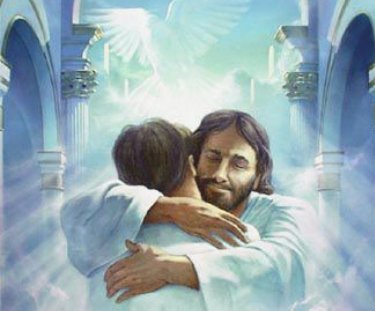
The Collect for this Sunday tells us that in the Paschal mystery God established the new covenant of reconciliation and prompts us who have been reborn into the fellowship of Christ’s Body to show forth in our lives what we profess by faith.
To reconcile means to restore to friendship or harmony, and in the Christian context, it means to restore our relationship with God, with one another and with the whole creation to the harmonious level that God has always meant it to be at.
In this sense, the reconciliation mission is not ours, but clearly God’s in the first place. It is God who has always wished for our relationship with Him to be at the greatest level of harmony, so that we can enjoy the fullness of communion with the divine that this harmony implies.
A love-based relationship with the Creator will eventually bring us back to our real being, which has always been our being in God’s life-giving love for all.
As a natural result of this harmonious relationship with our Creator, and not the other way around as some may fruitlessly try to enforce, we begin to live in harmony with one another and with all that has been created. That is why, when Jesus summarized the commandments into two, He followed the natural order: Love God with all your being, and your neighbor as yourself.
Jesus’ radical Way of Love is the perfect human expression of this divine reconciling mission that He has now entrusted His followers. But to reconcile, for true Christ’s followers, does not mean to be complacent with the dark forces of injustice and evil, or try to negotiate with them so as to reach a peaceful arrangement.
In the reading from the Book of Acts this Sunday we can clearly read how Peter and the rest of the Apostles clearly refused to follow the religious leaders’ orders not to proclaim Jesus’ Good News of salvation to all. They simply said, “We must obey God rather than any human authority.”
They knew this would bring about persecution, prison, and even death to them, but they were adamant in their determination to spread God’s reconciling mission to the world.
In the reading from the Book of Revelation we find John in the island of Patmos, and he was certainly not vacationing there. He had been exiled “because of the word of God and the testimony of Jesus”, as he says to his readers. He would not think of compromising his message to please any human authorities.
God’s reconciling mission, the one that Jesus carried out while on this earth, and the one He has entrusted us, is a loving and life-giving mission that only when we are filled by God’s Holy Spirit can be carried out.
This is a mission that calls for courage, discernment, and determination, and also trust and complete faith that God’s Spirit is guiding us all the time. It entails forgiveness when there is repentance, and even when there is no repentance on the part of the wrongdoers, because forgiveness will free us from the bondage of the desire for revenge, which only corrodes and poisons our lives. We must forgive in the sense of letting go of those feelings that hurt us, but that does not necessarily mean that we condone or approve the acts of injustice that others perpetrate against us or others.
It is interesting to notice how the resurrected Christ appears to His disciples with the marks of the crucifixion on Him. Is it only because He wanted to make sure they recognized Him, or could it be also because even if He forgave His tormentors and killers, the fact remains that what they did was horribly wrong?
Jesus’ phrase to His followers about forgiving and retaining sins has long been debated. He said it right after blowing the Holy Spirit on them and sending them to carry out the reconciling mission that He had received from the Father.
For centuries the church has interpreted it as a mark of authority, invested upon ordained ministers only, to absolve sinners.
Others have seen it as a reminder to all Christians that forgiveness is essential if the message of reconciliation is to be effectually carried out.
But what if it is also a reminder to us all that the Holy Spirit will guide us in discerning that there may be grave injustices that can simply not be condoned or approved, because doing so makes us accomplices of their perpetrators, and instead of helping to establish God’s reconciliation in the world, this complacent attitude may hinder it even further.
Just a thought.
May the Holy Spirit always guide us in the right spirit of reconciliation, in truth, mercy, and justice.
Fr. Carlos Expósito, Rector
|
RETURN TO TOP
Bishop Curry's Easter Message
“Easter is the celebration of the victory of God.”
This Sunday and Beyond - April 17, 2022
Get it in PDF form with calendar
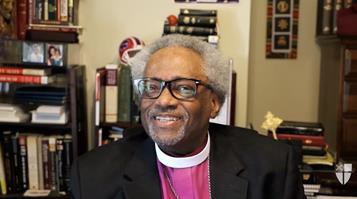
“Easter is the celebration of the victory of God,” Episcopal Church Presiding Bishop and Primate Michael B. Curry said in his Easter 2022 message. “The earth, like an egg, has been cracked open, and Jesus has been raised alive and new, and love is victorious.”
The festive day of Easter is Sunday, April 17.
The following is the text of the Presiding Bishop’s Easter 2022 Message:
In Matthew’s gospel, the resurrection of Jesus is introduced this way: “After the Sabbath, as the first day of the week was dawning, Mary Magdalene and the other Mary went to see the tomb. And suddenly there was a great earthquake, for an angel of the Lord had descended from heaven, came and rolled back the stone before the tomb until it was open.”
A number of years ago, when I was serving as the bishop of North Carolina, one of our clergy, the Rev. James Melnyk, offered a workshop on the Saturday before Palm Sunday on how to design, and color, and make Easter eggs.
I attended the workshop with a number of other people from around the Raleigh area and did my best to make an Easter egg. But Jim was a master at doing so. You see, Jim’s family hailed from Ukraine, and he had been making those Easter eggs from childhood, and spoke of his grandmother and the family tradition that hailed from Ukraine, the making of those Easter eggs. I knew the significance of the Easter egg and Easter. I knew the stories and the truth and the teachings about the coming of new life into the world, and the connection of life emerging from an egg, and Jesus rising from the dead, bringing new life and hope into our world.
But it became clear to me, in the last month or so, in this time when the people of the Ukraine are struggling for their freedom, struggling to be what God intends for all people to be, free people, that, that egg, which is deeply embedded in the life and the consciousness of the people of Ukraine, that those Easter eggs are not just mere symbols, but reminders of the reality of the resurrection of Jesus. Think back. On Palm Sunday, Jesus entered Jerusalem, as we know, riding on a donkey. That was a deliberate act on his part.
He entered Jerusalem at about same time that Pontius Pilate, the governor of Rome, would’ve been entering the city from the other side, from the other gate. Pilate would’ve been riding a war horse, accompanied by a cavalry and infantry. He would’ve been riding in the streets of Jerusalem at this, the dawn of the Passover, which was a celebration of Jewish freedom. Harking back to the days of Moses and the Exodus, Pilate knew that the people would remember that God decreed freedom for all people, and that the Roman empire, which held Judea as a colony, would need to put down, by brute force, any attempt to strike a blow for their freedom.
So, Pilate entered Jerusalem on a war horse, and Jesus entered Jerusalem on a donkey. The way of humility, the way of the love that we know from the God who is love, the way of truth, the way of compassion, the way of justice, the way of God, the way of love. That way faced the way of the world, brute force, totalitarian power, injustice, bigotry, violence, embodied in Pontius Pilate, governor of Rome. And the rest of the week was a conflict between the way of the empire and the way of the kingdom or the reign of God’s love.
On Friday, the empire struck. Jesus was executed on the orders of the governor of Rome. He was killed, and hope seemed to die with him. His followers fled, save those few women who stood by the cross, and save old Joseph of Arimathea and Nicodemus, who provided a tomb for the body of Jesus. The Scripture says they placed his body in the tomb and rolled the stone in front of the tomb. And there he lay dead, lifeless. There their hopes dashed on the altars of reality, their truth was crushed to earth. Their love itself seemed to die.
Then early Sunday morning, Mary Magdalene, and at least one other, and maybe a few other women, went to the tomb to anoint his body, to do the rites of burial that were customary. But when they got there, they realized that there had been an earthquake, that the earth, if you will, had been cracked open, and that the tomb was empty. The tomb was open and empty. The earth had been cracked open, and they would soon discover that Jesus had been raised from the dead. The earth cracking open, the tomb opening like an egg cracked open, and new life emerging from it.
That is the victory of life. That is the victory of love. That is the victory of God. The resurrection of Jesus is the victory that we can believe in and live by.
Many years before South Africa ever saw its new day of freedom, I heard Desmond Tutu in Columbus, Ohio. This was in the mid-1980s. This was while Nelson Mandela was still in prison, while there was no hope of deliverance. I heard him say in his speech that I believe that one day my beloved South Africa will be free for all of her children, Black, white, colored, Asian, Indian, all of her children.
I believe it, because I believe that God has a dream for South Africa, and nothing can stop God’s dream. And I believe that because I believe that God raised Jesus from the dead, and nothing can stop God. Easter is the celebration of the victory of God. The earth, like an egg, has been cracked open, and Jesus has been raised alive and new, and love is victorious.
In the year 2020, in that first Easter during the pandemic, when our church buildings were closed, we broadcast an Easter service from the National Cathedral, and members of our communication team organized for, what may have been the first time in our church’s history, organized an online choir.
And they sang an ancient Easter hymn. And they will sing it for you now. It sings of this victory, this victory of love of God. The strife is o’er, the battle done. The victory of life is won. The sound of triumph has begun. Alleluia, alleluia. The victory is won. Our task is to live in that victory, to live out that love until the prayer that Jesus taught us, thy kingdom come, thy will be done on earth as it is in heaven. And so this Easter, behold, the Ukrainian Easter egg, for the victory of love and life is one.
(Virtual choir sings)
Alleluia, alleluia, alleluia!
|
RETURN TO TOP
The Name above Every Name
This Sunday and Beyond - April 10, 2022
Get it in PDF form with calendar

The second chapter of Paul’s letter to the Philippians (vv.5-11) contains what has been identified as one of first Christological hymns of the nascent church.
Paul’s main intention, expressed in the opening verse here, is a call to all Christ’s followers to have the mind of Christ, and then he goes on to express who Jesus Christ is for the Church.
What follows after the opening verse is like a small treatise on Christology, or the systematic theological concept of Jesus Christ as our Lord and Savior.
Firstly, Paul refers to Christ’s self-emptying of His primal divine glory to become perfectly human and a servant of all.
Next, he refers to His humbleness and obedience to God’s will, which led Him to the death on the cross.
And then Paul talks about His exaltation, through His glorious resurrection and ascension.
Succinctly speaking, these are the same themes that we will be dealing with during Holy Week, starting with the Sunday of the Passion this week.
But at the end of the hymn Paul introduces the topic of Jesus’ name.
Names have meaning. For the Jewish people, names were essential to identify not only a person as an entity, but the character of that person, and the person’s God-given mission on earth.
When the angel announced the birth of the Christ to Mary, he insisted that she would name Him Jesus. The English name Jesus is, in fact, Joshua in the Hebrew language. So the name of the sixth book in the Bible is the same as that of the Christ.
Joshua—meaning God saves—was the leader who completed what Moses had begun. He was the one who, through several battles and glorious feats, supported by God’s power, led the people into the Promised Land, and before he died he made clear what it meant to commit oneself to the living God.
The Joshua we have gotten to know as Jesus in English is our supreme Savior and Lord, and He has also made it absolutely clear what it means to serve the true God, and how this service shows itself in our deeds of loving service towards our neighbors.
But beyond all this, names for the Jewish people meant the persons themselves, their true identity, so when Paul says Jesus has been given the name above all names he obviously means that no other being on earth, under the earth, or on the heavenly realms can claim the intimacy in the communion with the Creator that Jesus Christ our Lord has attained, not through any intellectual achievement, but through His absolutely selfless loving sacrifice made on our behalf.
As we come to celebrate the glorious deeds that led to His sacrifice and to His ultimate glorious exaltation, let us also bend our knees before the one whose name is above every name.
Fr. Carlos Expósito, Rector
|
RETURN TO TOP
When Loss Is the Greatest Gain
This Sunday and Beyond - April 4, 2022
Get it in PDF form with calendar

In this world of ours achievement and success are usually associated with some kind of increase in something: increase in material wealth and possessions, increase in academic records, higher records in sports, higher points in performances, etc.
Interestingly enough, when it comes to our health parameters, there are several instances when a decrease is the desired goal: a lower weight, a lower sugar level, a lower calorie intake, less fat in the body, etc.
The health of our body and that of our soul are closely related, as we all know. For the spiritual side of our lives, less is often better than more, when it comes to material things and attachments.
In his letter to the Philippians, the Apostle Paul states that he regards everything else as loss as compared to the surpassing value of knowing Christ. It is vital to remember that Paul was a Jew, and for the Jews the verb know meant much more than a simple intellectual grasping. It meant, above all, an intimate and personal experience that involved the whole being.
Therefore when he uses the expression knowing Christ he is referring to an actual personal encounter with Him that involves not only Paul’s mind, but also his heart, body, and soul.
Paul goes so far as to use the word rubbish to refer to all he might have lost in order to gain Christ and be found in Him. And he makes it clear that only righteousness he may boast of is not one of his own based on the law, but the one that comes through his faith in Christ.
Paul is also humble enough to admit that he has in no way achieved the goal he is pursuing: becoming like Christ in His death if somehow he may attain the resurrection of the dead.
Even so, he affirms that he presses on to make this goal his own, thanks to the fact that Christ, through His loving grace, has made him His own.
The Apostle concludes this part of the letter by stating that his aim is simply to forget all that lies behind and strain forward to what lies ahead. It is clear that what lies ahead for him is the wonderful prize of the heavenly call in Christ Jesus.
As the Lenten season moves on and we approach the commemoration of God’s wonderful deeds of salvation worked through Jesus’ passion, death, and glorious resurrection, let us also realize that the best way of achieving our most wonderful gain is by losing.
We must learn to also consider a rubbish all that stands in the way of sharing in Jesus’ death—the deprivation of all that attaches us to our self-centered petty lives—so that we can finally share in His glorious and abundant resurrected life.
Fr. Carlos Expósito, Rector
|
RETURN TO TOP
Lost and Found
This Sunday and Beyond - March 27, 2022
Get it in PDF form with calendar
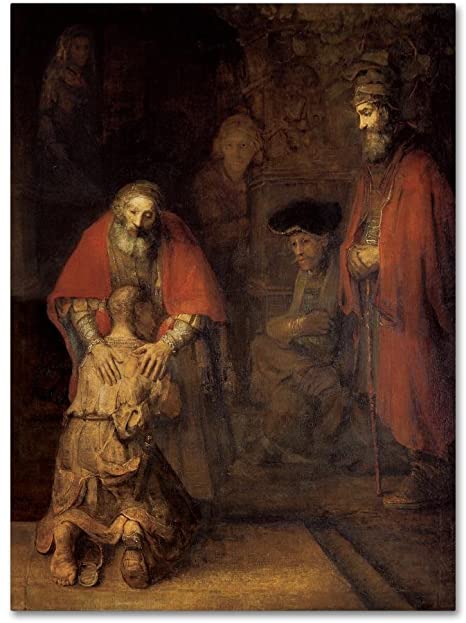
In his second letter to the Corinthians, in chapter 5, the Apostle Paul deals with the topic of our reconciliation with God as Christ’s main mission.
To be reconciled with God means to be brought back to friendship or harmony with Him, and in this particular case Paul is referring to God’s redeeming work through Jesus Christ, which makes us a new creation or re-creation—new creatures that can now live in a harmonized state with the Creator.
Although Paul uses the term new creation he does not mean that in Christ we have become alien creatures from another world, totally disconnected from God’s primordial creation. If he had meant that, he would probably not have used the term reconcile to refer to this new kind of relationship between the Creator and His human creatures.
What Paul is pointing out here is that thanks to God’s unconditional love and grace, which in the fullness of time has been manifested to us in Christ as His incarnate Word, all the trespasses that get in the way of our communion with God and with one another can be done away with through our repentance and His forgiveness, which puts us back on the right track to the House of God’s love.
In other words, Paul assures us that through the power of God’s love and grace, we are restored to our true selves in God—the living image of our Creator on earth.
At the same time, in this letter Paul makes emphasis on our reconciling mission as Christ’s followers. Just as we are reconciled to God and made a new creation in Christ, we have been given the mission to be ambassadors of Christ’s reconciling mission for this world.
Our mission, then, is to bear the Good News of God’s unconditional love and grace towards all, and to show forth both in our words and our lives, that just as we can go astray and depart from God’s House by following our own selfish whims, and waste away the wonderful gifts that our Creator has endowed us with, He is always willing to take us back as His sons and daughters, as long as we truly repent, and restore us to the harmonious communion with Him and with one another we have always meant to share.
As the Parable of the Prodigal Son depicts, our Creator’s joy is the greatest when one of His lost sons or daughters is found again, and reconciled to Him. But God’s joy and love is so all-encompassing that He wants to share it with the rest of His creatures.
God’s loving care is for all, and none of His creatures is left out of it. But even when we can recognize that someone has been a great trespasser and wasted their God-given gifts away, if they turn back and return to the Father’s House, we should also share in His rejoicing, instead of feeling angry or resentful for the return of the lost sheep to their fold.
Fr. Carlos Expósito, Rector
|
RETURN TO TOP
Repentance and God's Grace
This Sunday and Beyond - March 20, 2022
Get it in PDF form with calendar
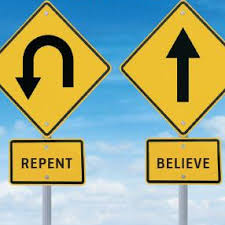
When confronted with the reality of our tendency to fall back into our old habits and addictions, even when we have already experienced the blessing of embracing Jesus´ Way of Love and decided to follow Him, we may feel particularly angry with ourselves, or even hopeless and unworthy of God´s love.
However, Jesus and His first followers, who were grounded in the Old Testament tradition, were well aware of this human tendency, and warned about the need to embrace a repenting attitude at all times.
Repentance is what takes us back to what is most authentic within us: our true nature in God.
Authentic repentance is a truly transforming process. It starts with a deep feeling of regret for what we have realized that separates us from God’s Way of Love, but it must not stay at this primary stage. If it does, it may become a hindrance rather than a tool that enables us move forward into redemption. A heart full of regrets, hopelessness and guilt, and will not help us in our movement towards a transformed life.
We should not think, as Paul makes clear in his first letter to the Corinthians, that God is willing to put us to tests we cannot endure so that we inevitably fall back into sin. What Paul insists on is that we should be on the alert for the temptations to fall back into the old ways, and also assures us that the tests we go through in life will never be too much for us to overcome with the help of God’s grace.
The cycle of repentance can only be completed when we have left the old ways behind and have changed our mindsets and habits, broken away from the addictions that enslaved us, and have made retributions, when needed and possible, to those whom we have hurt.
Repentance is possible because of God’s loving grace to restore us to a close relationship with Him. This restoration implies forgiveness, and we need to forgive ourselves also if we are to move forward in this relationship.
Forgiving ourselves does not mean that we forget our wrongdoings or pretend they never happened. What it does mean is the conviction that God’s grace restores us to a loving relationship with Him and with one another, and that we are now free and guilt-ridden, ready to bear the fruits of love our Creator has always intended us to bear.
In this Sunday’s Gospel reading, Jesus stresses the need of repentance in our lives, but He also assures of God’s loving grace, which will always give us a new opportunity, even when our lives may seem totally devoid of the fruits of love, and with the Holy Spirit’s help, dig up and fertilize, in the hope that next time the fruits will be there for all to savor and be blessed with.
Fr. Carlos Expósito, Rector
|
RETURN TO TOP
Standing Firm in the Lord
This Sunday and Beyond - March 13, 2022
Get it in PDF form with calendar

The Lenten Season invites us to turn to God’s loving way, to reshape our lives in a closer likeness to our Creator so that we can be active bearers of His image in the world.
The main word that stands out throughout the season is repentance. We are being urged to turn from the old ways, from our self-centeredness, ambitious selfishness, and inordinate love of worldly things, to the selfless unconditional Way of Love that Jesus has taught us through the words and deeds of His own blessed life.
This total change of mindset that would transform the way we live our lives is not an easy one to achieve. It is like a transfiguration of our whole beings, in which, as Paul declares in his letter to the Philippians, “He will transform the body of our humiliation that it may be conformed to the body of His glory…”
When asked if only a few would be saved, our Lord, according to Luke’s Gospel, did not answer in the affirmative or negative. Instead He said, “Strive to enter through the narrow door…”
Jesus was clearly admitting that following His radical Way of Love would not be an easy task. He was aware of the many temptations—akin to the ones He had gone through Himself—that His followers would be facing.
He was aware that the satisfaction of the body’s appetites would conspire against the resolution to put nobler and selfless commitments in the first place. He also knew that the ambition of material wealth, fame or recognition would stand in the way of many well-intentioned followers.
And worst of all, spiritual pride—the conviction that one is so righteous and the others are so wicked that they deserve no mercy—would make many go so far from God’s all-encompassing love that turning back would cost them a great deal of transformative effort.
Does this mean that we are all hopelessly condemned not to be saved?
Not in the least. In His reply to the question whether only a few would be saved, Jesus ends up by offering a vision of people who would be coming from the four ends of the earth and would eat in the Kingdom of God. Obviously this does not point to just a few people.
Jesus was always clear in setting the mark high. The Kingdom of God, or Kingdom of Heaven as Matthew usually refers to it, is not just a fine place to live in. There is perfect communion in love with our Creator, with one another, and with the whole of creation here. It is beyond our ken.
Standing firm in the teachings of Jesus Christ our Lord that we have received through the Apostles, His first followers, and have been handed down to us throughout the generations of believers can be a hard task. But we have the Holy Spirit, the Counselor, the Defender, and the one who always tells us the Truth because He is the Spirit of Truth.
This Holy Spirit that Jesus Himself has left us will give us the strength to face temptations and overcome them, and to come out victors in the spiritual struggle against the evil one.
Yes, we can stand firm in the Lord, because He Himself will sustain us till the end of times.
Fr. Carlos Expósito, Rector
|
RETURN TO TOP
Lead Us Not Into Temptation
This Sunday and Beyond - March 6, 2022
Get it in PDF form with calendar
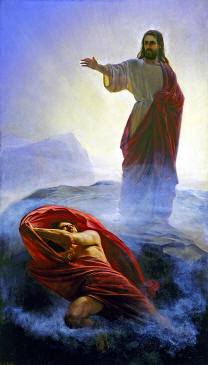
As we come to the first Sunday in Lent we are told the story of Jesus undergoing temptation in the wilderness while fasting for forty days and night.
Whether we, as Episcopalians, choose to believe that the evil one is an actual being that opposes God’s will and those who decide to follow it, or just the dark side that is part of all of us and can lead us astray from our true identity in God, the fact is that Jesus was tempted in an extreme way while He prepared Himself for the ministry that He was about to undertake.
No wonder so, because the more selfless and God-centered our purpose is, the harder the opposition it finds from the dark side.
In the wilderness there are practically no outer distractions. We are set apart from other voices and our daily occupations, so there is no other choice than to listen to the voice of our minds (or the voice of the evil one planted in our brains, if we choose to believe in this way).
Our minds are usually restless, and find it really hard to quiet down and center on our Creator and what is the real essence of our selves—our being in God. They wander from one idea or image to the next one, and linger on those that promise self-satisfaction of any kind.
When Jesus was baptized He had the revelation of His true identity in God, and His mission became clear to Him. He knew that being the recipient of God’s infinite love also implied being the bearer and sharer of such love, even to the point of self-sacrifice.
But because He was fully human as He was fully divine, He had to face it and be absolutely sure that He had the courage and determination to carry out such a challenging and huge mission. Starting the mission and faltering mid-way would do more harm than good to the world, and He was aware of this.
He might have undergone several temptations throughout His stay in the wilderness, but the Gospels sum them up in three:
The temptation to give up His resolve to undergo the discipline of fasting and satisfy His personal hunger by altering the natural course of nature (turning stones to bread).
The temptation to use His divine filiation to become the most powerful of worldly rulers by serving the dark forces of self-centeredness and selfish dominion of others.
The temptation to use this same filiation with the Creator to boast of it to others by putting His life in unnecessary danger, demanding God’s supernatural protection.
To counterattack all of these tempting thoughts and ideas, Jesus uses the powerful shield of Holy Scripture, and comes out victorious. But it is relevant to notice that there is one instance in which the tempter quotes Scripture (“He will command His angels concerning you, to protect you.” and “On their hands they will bear you up, so that you will not dash your foot against a stone.”) in a twisted way to convince Jesus of the authority of the idea he is trying to plant in Jesus’ mind.
This should serve us as a warning that people may simply take passages of Scripture out of context and try to use them to justify their self-centered whims. The guidance of the Holy Spirit in deep prayer is always the ultimate judge of the validity of a given passage in the Bible.
If we think that we can live without temptation, we are only deluding ourselves. The real world is full of temptations. Every single moment we can be assaulted by outer or inner insinuations to please our egotistic wishes, to relinquish our determination to stick to higher ideals, or to succumb to self-centered interests that hurt others, and even make ourselves and others believe that they are in accordance with “God’s will”.
The prayer that Jesus taught has a phrase that has been translated into English as lead us not into temptation. In other languages, like Spanish, the phrase has been translated as the equivalent of do not let us fall into temptation.
Anyway, it should be clear in our minds that we will not become better people, truer to God’s image, by never having to face the real evils of this world, so that we can never fall into temptation.
Instead of prompting us to advance in the spiritual path, that would only keep us stagnant. Moreover, it would hinder us from becoming the bearers and sharers of God’s love and light that we are called to be.
We need to face the hard and often evil reality of the world, and the dark side of our lives so that we may, with the aid of the Holy Spirit, in prayer, and with the guidance of His Holy Scripture, overcome temptations and come out victors in our mission to be the much needed light for this world.
Fr. Carlos Expósito, Rector
|
RETURN TO TOP
The Dazzling Glow of Love
This Sunday and Beyond - February 27, 2022
Get it in PDF form with calendar
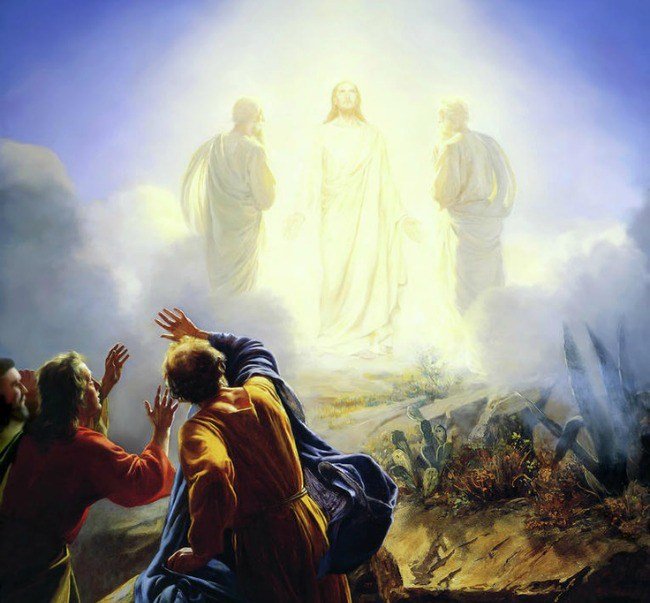
The last Sunday in the season after Epiphany always brings us the Gospel reading of Jesus’ Transfiguration. This is the only event which is actually celebrated twice in the Christian calendar: on this Sunday, and also on August 6th, which is the Day of the Transfiguration.
The reason may be that those who set up the readings for the Christian calendar wanted to make sure that this event was not overlooked, since August 6th may fall on any day of the week, and not many churches would actually have a celebration on that day.
Anyway, the fact is that it is also more than proper that this season culminates with the most outstanding manifestation of Jesus’ divine filiation: the dazzling glow of His glory shining forth from within His whole being.
This was not a public event. Jesus’ intention was not to show forth any outer sign of His glory. He took the three disciples that were closest to Him to a mountain to pray, and then this just happened.
What the disciples saw and heard was a true revelation to them, a real epiphany. Jesus was accompanied by Moses and Elijah, the greatest representatives of the Law and the Prophets, the two main components of the Hebrew Torah or Instruction. And they were talking with Jesus about His departure and what He would go through in Jerusalem. In other words, they were precluding Jesus’ passion, death, and resurrection.
It is significant to notice that Moses’ face also shone with a special glow when he came down from the mountain where he talked with God to receive the tablets of the Law. And Elijah was snapped out of the earth in a chariot of fire. Here we perceive that dazzling light in Holy Scripture is always a sign of communion with God’s loving will and purpose.
Theologically speaking, Jesus is said to recapitulate all that was forestated in the Law and the Prophets. His radical Way of Love is the perfect incarnation of God’s love in the flesh. He not only uttered out God’s love and lived it out in His wonderful healing and life-giving actions, but He gave Himself out in perfect love.
The conversation with Moses and Elijah is about this ultimate act of self-giving love. And the voice that is later on heard by the disciples corroborates that He is God’s love made man as the beloved Son of God, whose voice needs to be heeded if we are to be faithful partakers and bearers of this love.
In his first letter to the Corinthians, the Apostle Paul talks about the different gifts that the Spirit bestows on the faithful, but then he goes on to show them what he calls a more excellent way.
This way is none other than the Way of Love that Jesus proclaimed and lived out. As Paul clearly points out, even prophesies and knowledge will come to an end, but love will always remain.
When our lives are filled with God’s love, and we live out this love towards our neighbors and all other creatures we come in contact with, we are also gradually transfigured, and we come to shine with the pure dazzling glow of love. It may not be visible to all, but those who are born of God’s love will see it, and will also shine forth with the same light—not the spotlight of vainglory which some go after—but the only true light of self-giving love.
Fr. Carlos Expósito, Rector
|
RETURN TO TOP
The Christian Hope
This Sunday and Beyond - February 20, 2022
Get it in PDF form with calendar

The New Testament’s main theme is our hope as followers of Christ. The message in the Gospels and the rest of the writings all point to one main theme: the fullness of life that Jesus has made possible for us through His self-giving.
This new life is depicted as the resurrected life, of which Jesus’ resurrection is the first fruit. It is described with adjectives such as new, glorious, full, and abundant. It is also depicted as a life lived in close communion with the Father and the Son, in the fellowship of the Holy Spirit.
But what is a resurrected body like? And what kind of life are we hoping for in this new body?
The New Testament writers do not give us many details about these matters, and those of us who rely solely on the witness of scripture prefer not to elaborate on these points.
What we usually do is to use the same terms that are listed above to refer to the Christian hope, and if asked more directly, as it happened to me when I was in a supermarket wearing my clerical shirt the other day, we usually say that we have full trust in God’s love and that we are sure that God will surprise us with a wonderful life that we can only dimly foresee now.
There is truth in that statement, of course. But the fact is that we human beings are curious by nature and would like to know more.
This is not new. In his first letter to the Corinthians, Chapter 15, Paul gives some answers to their inquiries about the resurrected body. Let us take a look at what he affirms.
The first thing he points out is that what is buried is different from what resurrects. He uses the analogy of the seed and the plant to make this clear.
The body that dies is perishable, the one that resurrects is imperishable, so it can no longer decay or die.
The resurrected body is also glorious and powerful. And it is not a physical body, but a spiritual one. It is not from the earth but from heaven. The word heaven was used by the New Testament writers to refer to the godly spiritual realms.
But notice that Paul does not say that the resurrected life is bodiless. He explicitly speaks of a body. It is an embodied life. But this body is different. He calls it a spiritual body. He clearly states that flesh and blood cannot inherit the kingdom of God, because they are perishable.
When the Gospels depict the resurrected Jesus, it is clear that there is a body that can be touched and can even eat. Jesus’ resurrected body even shows the marks of the crucifixion. But there are also hints that this body is somewhat different in some of the passages. Jesus cannot always be recognized immediately by His followers. And He seems to be able to pass through closed doors, and also disappear all of a sudden, as in the passage of the two disciples walking to Emmaus.
Jesus’ body is also depicted as “ascending to the Father”, although it is not possible to explain how this could happen. The fact is that what Luke depicts is a bodily union with the Creator, not a bodiless fusion in the spirit.
As to what kind of relationships we will have with others in the resurrected life, there are few indications in the New Testament. One of them is when Jesus answers the tricky question that the Sadducees pose about the woman who had seven husbands who died in succession and ask Jesus which of them would be her husband when she resurrects. They did not believe in resurrection and posed this question to ridicule this belief.
To this Jesus replies that in the resurrected life people will not marry or be given out in marriage, but would be like the angels in heaven.
It has been inferred from this that in the resurrected life universal love precludes any kind of closer relationship between two persons. However, we need to be aware that the institution of marriage in Jesus’ time was most of the time a contract where love was not the primary reason.
So there may be universal love without the exclusion of some more intimate relationships between people. One does not necessarily preclude the other, as we saw in Jesus’ relationships with His followers. Three of them were his closer friends among the twelve he chose to be his inner core group.
There is not much else that we can infer about the resurrected life from what the New Testament writers tell us, but for those who are curious, these few hints might give them some insight.
All in all, even if there is not much that we can know in advance, the Christian hope is still the greatest of hopes, simply because our God, who gave Himself in loving sacrifice for us, will give us nothing short of the best of lives to be lived and shared in communion with Him, with one another and with the whole of creation.
Fr. Carlos Expósito, Rector
|
RETURN TO TOP
The Cornerstone of Our Faith
This Sunday and Beyond - February 13, 2022
Get it in PDF form with calendar

We all love Christmas with its wonderful decorations and carols, and the feeling of goodwill and love it entails, apart from the fact that the real message it conveys—that God has become man in Jesus—is one of the main tenets of the Christian faith.
However, whether we like to admit it or not, it is not Christmas but Easter that is the real cornerstone of our faith. In fact, Christmas celebrations were a much later addition to the traditions of the Church, whereas from the very beginning Jesus’ followers gathered for the weekly commemoration of Christ’s death and resurrection in the Eucharist, and it soon became a tradition to celebrate His passion, death, and resurrection yearly, with Easter as the core of all Christian life.
When we read the Gospels we realize that the four evangelists dedicated a lengthy part of their writings to narrate the events leading to the crucifixion and resurrection of our Lord. There is no real good news without Jesus being raised from the dead, and without the promise that His followers would share in the same resurrected life.
The Christian hope can be put in a nutshell by referring to Christ’s resurrection as the “first fruit of those who have died”, as Paul puts it in his first letter to the Corinthians. So what we hope for is what was manifested in Jesus Christ after God raised Him from the dead. A totally new life, an abundant life in perfect communion with the Creator, with our fellow human beings, and all of Creation. A life filled with authentic joy, love, harmony, where justice and peace kiss each other, where decay, sickness, injustice, and death have been done away with.
This is only possible through God’s infinite loving grace. We have not earned this as a reward for our righteousness. It is through God’s all-encompassing love, made manifest in Jesus’ self-sacrifice that we will inherit this promised new life in our resurrected bodies.
Resurrection poses lots of problems to human reasoning and logic. How can this be? How does it happen? What kind of body is a resurrected body? How can a joyful life be lived out of one’s own time frame? Can we be happy sharing our lives with those who wronged us and those we wronged? Can we be happy sharing our lives with those who are different from us?
Obviously there has to be a deep inner transformation in us so that this promised new life can really be a joyful one for us. Only through the transforming power of the Holy Spirit can we learn to forgive and be forgiven, to include those whom we see as “different” or “alien”, to open up our hearts and minds to what goes beyond our preconceptions modeled after our cultural patterns, and to begin to model our lives after Jesus’ radical Way of Love.
For some, even within our churches, the problems seem unsurmountable, and there is a tendency to disregard resurrection as a reality and replace it with some other more “logical” notions, like “a life lived in love”, “becoming part of the infinity of the universe”, or some others.
As promising as these or some other alternatives may sound, even if they contain some part of the reality of resurrection, this is not the true Christian hope.
In his first letter to the Corinthians, Chapter 15, Saint Paul is adamant about this. He clearly states, “If there is no resurrection of the dead, then Christ has not been raised; and if Christ has not been raised, then our proclamation has been in vain and your faith has been in vain.
…If for this life only we have hoped in Christ, we are of all people most to be pitied.”
When it comes to resurrection, there are no middle grounds. Resurrection, as Paul points out, is either real and the very core of our faith, or false and the vainest of hopes.
Are we Christians to be pitied, or are we the ones who have the assuredness of the greatest of all lives as our true hope?
Fr. Carlos Expósito, Rector
|
RETURN TO TOP
Proclaiming the Good News
This Sunday and Beyond - February 6, 2022
Get it in PDF form with calendar

We Christians are all familiar with the phrase the good news, which we also know is the equivalent of the English word gospel.
But do we ever really stop to ponder deeply on what the phrase entails? Why good news? What is particularly good about it?
In his first letter to the Corinthians, Chapter 15, the Apostle Paul reminds these brothers and sisters in the faith of the good news that he proclaimed to them, and they gladly received.
First of all he reminds them that they stand in that news. It is that good news that makes them be the community of faith they are. Without it, the community they form part of would have no sense at all.
Second, he insists that they are actually being saved through this good news, if they hold firmly to it.
Why does this good news save those who hold firmly to it?
Paul goes on to explain that this is what he received: that Christ died for our sins in accordance with the scriptures, and that He was buried, and that He was raised on the third day in accordance with the scriptures, and then appeared to his closest followers, to multitudes of believers, and even to him, by the grace of God, although he had persecuted the church of God, and did not consider himself worthy of being called an apostle.
So this is his proclamation, which is the same of the other apostles, and what the faithful have come to believe.
Perhaps we also need to be reminded of what this good news is really about.
The main points ought to be clear, but we sometimes get lost in so many bypasses and bifurcations that we lose track of the essential message that was proclaimed to us, and that we are being urged to proclaim.
Christ died for our sins. And this is in accordance with the scriptures. It is a fulfillment of what the Law, the Prophets, and the Writings of the Old Testament essentially proclaim.
What this means is that Jesus Christ not only talked about and practiced God’s all-encompassing love for all, but He gave Himself in love so that we might have abundant and real life.
He did not only show us about God’s love, so that we might follow the path that leads to abundant life, He offered Himself in sacrifice so that His ultimate self-giving could conquer the powers of evil and death, not only for Himself through His glorious resurrection, but above all, for all those who would follow His way.
This is the essential message of the Christian faith, and we must stick to it with all our being if we are to be saved.
Proclaiming that Jesus was an example of a life lived in unconditional love, that His teachings were the best, and we had better follow them, is good news. But it is never enough.
The real goodness about the news of Jesus Christ goes far beyond that.
His life, death, and resurrection radically changed the course of the history of human life. It opened for us the access to a real and abundant life, a resurrected life in God’s love. But this cannot happen by mere imitation. It is not by our own striving that we will attain it.
It is by His grace, by His sacrifice, by His defeat of the powers of evil and death that the way is now open to us. It is by His will that the Holy Spirit has been given to us to support us and guide us on the path to salvation. That is the really good news that we have received. It is the greatest news that anyone could ever hear.
It would be so selfish to keep it to ourselves. We need to spread it out to the ends of the world. And that is exactly what Jesus Himself has commissioned us to do.
Let this be a good reminder for us as well.
Fr. Carlos Expósito, Rector
|
RETURN TO TOP
Joy and Sorrow
This Sunday and Beyond - January 30, 2022
Get it in PDF form with calendar
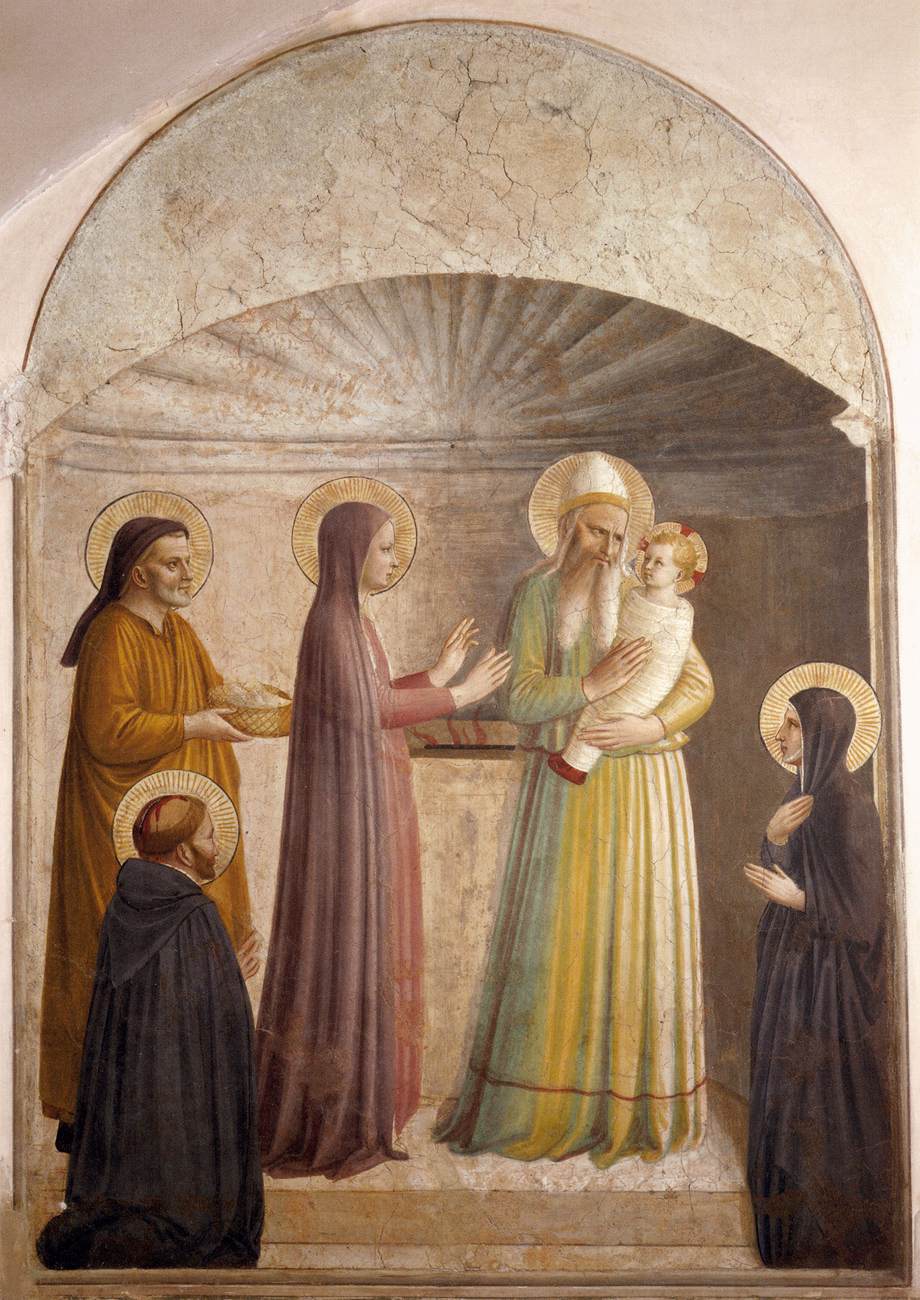
The Feast of the Presentation of Our Lord Jesus Christ in the Temple, also known as Candlemas or The Feast of the Purification of the Blessed Virgin Mary, is celebrated on February 2nd every year. In some churches where it has a long-standing tradition, it can also be celebrated on the Sunday closest to that day (as in the Church of England, for instance).
What this feast commemorates is based on what appears in the Gospel according to St. Luke in Chapter 2, verses 22-40.
According to the Law, 40 days after a woman gave birth she had to be purified, and if the baby was a boy, he had to be redeemed. For this ritual, a lamb without blemish was sacrificed, but if the family had no means to offer a lamb, the Law prescribed that the lamb could be replaced by a couple of turtledoves. This was what Joseph and Mary were able to bring.
What Joseph and Mary were expecting was to take part in a temple ritual in which the two doves would be sacrificed. To their surprise, however, this was not meant to be an ordinary ceremonial occasion.
They were greeted by an old man, called Simeon, who took the baby in his hands, and praised God with all his soul. Joseph and Mary must have seen something special about him when they agreed to trust the baby Jesus to him.
Simeon exclaimed, “Lord, now lettest thou thy servant depart in peace, according to thy word, for mine eyes have seen thy salvation which thou hast prepared in the presence of all peoples, a light for revelation to the Gentiles, and for glory to thy people Israel.”
Simeon was a man of advanced age and the Holy Spirit had revealed to him that he would not see death until he had seen the Lord’s anointed one. We can well imagine how many times he would have asked the Lord if the promise was about to be fulfilled. But he waited patiently and hopefully, and was present to the Lord all the time, until the glorious moment came.
Hearing this, as well as hearing Anna, the prophetess of a great age, who also gave thanks to God and spoke of Jesus to all who were looking for the redemption of Jerusalem, must have filled Joseph and Mary with the greatest of joys. These were joyful truths being declared to them. They corroborated what the shepherds had told them about the baby when He was born.
But then Simeon tells Mary some other truths that fill her with sorrow. He says, “Behold, this child is set for the fall and rising of many in Israel, and for a sign that is spoken against (and a sword will pierce through your own soul also), that thoughts out of many hearts may be revealed.”
Simeon was a man filled with the Holy Spirit, and this is the Spirit of Truth. There are truths we would rather not hear, but Simeon could not keep silent about these facts.
The Light that shines as the revelation of God’s unconditional love brings joy and hope, but also opposition from those who choose to walk in the darkness of self-centeredness and arrogance. They cannot stand the Light, and will do anything to try to extinguish it. And this brings pain for Him who is the Light, for those who follow the Light, and particularly for the one who carried in her womb the Light of the world.
So this is a celebration in which joy and sorrow are closely intermingled. They cannot be set apart.
Jesus’ life on earth was this intermingling of joyful and sorrowful moments, and so was Mary’s. Our lives as Christ’s followers are destined to be like their lives, filled with the great joy of knowing that we are following the true path of love and abundant life, and showing others the path as well; but also finding opposition, ridicule, scorn, and even slander, when we try to spread the true Light to the world around us.
Nevertheless, just as Simeon and Anna waited with perseverance and hope, and were present to God all the time, we are also called to persevere in our hopeful wait, having the certainty that no matter how dark and sorrowful the road may be, there is a glorious end that will fill us with the most unimaginable of joys: true and abundant life filled with Christ’s true Light.
Fr. Carlos Expósito, Rector
|
RETURN TO TOP
Members of One Body
This Sunday and Beyond - January 23, 2022
Get it in PDF form with calendar
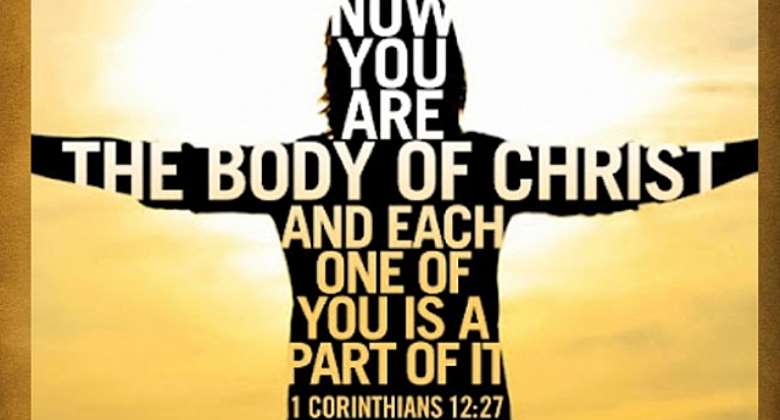
In his First Letter to the Corinthians, Chapter 12, the Apostle Paul makes use of a clever and appropriate analogy to refer to the Assembly of the saints, the nascent Christian Church.
It is hard to imagine the great diversity and numerous contradictions that the new converts in such an important cosmopolitan city as Corinth displayed.
Many of these people came from a pagan background, where different deities were worshiped, while others were Jews. They also had different social backgrounds and philosophical views. Some may have been wealthy, and some extremely poor. Some may have been slaves.
Paul starts this section of the letter (verse 12) by reminding them that all—regardless of any social or national differences--were baptized in one Spirit and into one Body, which is Christ the Lord.
Then he uses this remarkable analogy with the human body to refer to the Church as Christ’s Body. This analogy serves Paul to highlight some points which he considers crucial in the understanding of each person’s role within the Church.
First, he stresses the need of diversity within the body. Each member is different and has a specific function to fulfill, and a body can only function properly if it has all these diverse members doing their functions in a harmonious way.
He also points to the fact that in the body no member can work without the rest, and they are all indispensable. If one of them is not present, the body can no longer function properly as such.
Finally, he makes it clear that it is essential to care for all members in the body, for if one of them suffers, the rest suffer as well.
Through this analogy, Paul is encouraging the converts at Corinth to consider that each of them has an essential mission to accomplish, according to the gifts that the Spirit has bestowed on each, and that no one is superior or inferior to another.
Likewise, he insists in the need to care for one another within the community, and to be mindful of keeping the necessary unity, in spite of the diversity that exists in all congregations.
Self-centeredness and arrogance can only destroy the Church, just as the cells that want to grow and reproduce for themselves, and no longer work in harmony with the rest, become cancerous cells and can lead to the death of the organism.
At the end of this section (ending in verse 31a) Paul encourages each member of the Church to strive for the greater gifts. And in the section that follows (which is not read this Sunday) he clearly states that among all possible gifts of the Spirit, no matter how marvelous or attractive they may seem, none can be greater than the gift of Love.
As members of the present-day Church, we can also make good use of this analogy with the human body, and profit from it, by remembering our individual essential roles, and by keeping, above all, the necessary unity in diversity which will make Christ’s Church not only remain but grow and expand until its mission has been fulfilled.
Fr. Carlos Expósito, Rector
|
RETURN TO TOP
The Joy of Union
This Sunday and Beyond - January 16, 2022
Get it in PDF form with calendar
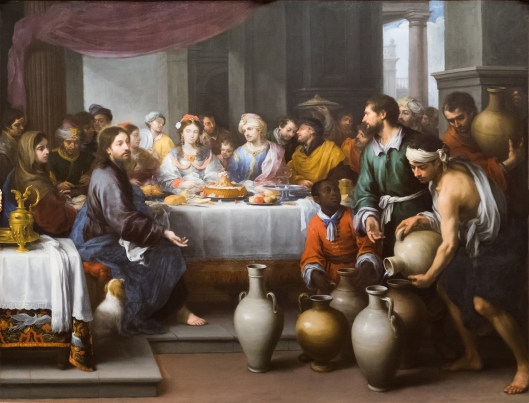
The Second Sunday after Epiphany in Year C always brings us John’s Gospel reading with the account of the wedding at Cana. This is referred to by the Evangelist as Jesus’ first miracle or sign that prompted his closest followers to believe in Him.
For the Jewish people weddings were a major event that lasted several days, and the joy and merriment of the participants, including the groom and bride, presupposed the abundant drinking of wine. There had to be a good provision of wine so that people kept on dancing and laughing, expressing their joy for the union of two people who would be starting a new family in the community.
It is known that excessive drinking of wine is not a healthy practice, but I think we may excuse the newly-wed couples and their relatives and friends for doing it during these particularly special occasions.
What the bride and the bridegroom celebrated together with the accompanying relatives and friends was the most intimate of unions, what the first book of the Bible describes as “becoming one flesh.” The verb used in Hebrew to refer to the physical intercourse between two persons is the same as for “knowing”. That means that during this intercourse the two persons become as one and really get to know each other.
So for the Hebrews marriage was of paramount importance. It was sacred and blessed by God Himself. This intimate union between two persons was like a symbol of the union of God to His people, and the union that God’s people were expected to have with one another.
God’s favor towards His chosen people is depicted in the Book of Isaiah as the delight that the bridegroom has in the bride, and the way he rejoices over her.
When Jesus was invited to this wedding at Cana with His mother and His disciples, and they ran out of wine, Jesus’ mother immediately realized that this could put an end to the rejoicing, and to the celebration itself. This was no minor issue. It was something that needed to be remedied at once.
Mary used her motherly influence, in spite of Jesus’ protests, to prompt Him to avert the disaster. And Jesus turned the water into wine. But not just any wine, but the best wine, according to the chief steward in the party.
Jesus may not have been ready to show His life-giving powers yet. But deep inside He knew His mother was right. The rejoicing at the intimate union of these two persons could not be marred. It had to be saved. And it was done in the abundant and excellent way that only God’s Son could make possible.
There is great joy both on earth and in the heavens when two souls are united because union based on love is the essence of our true being in God. May we always greatly rejoice in these unions, and may we strive for the greater union of all souls in love, which is the final goal of creation.
Fr. Carlos Expósito, Rector
|
RETURN TO TOP
The All-inclusive Covenant
This Sunday and Beyond - January 9, 2022
Get it in PDF form with calendar
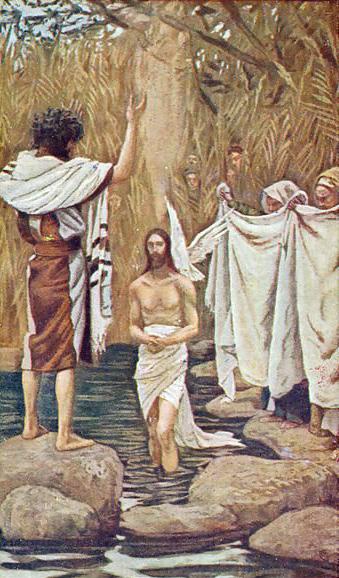
This coming Sunday is the celebration of Our Lord’s Baptism at the Jordan River, and the day is also a prioritized Sunday for baptisms in several churches, including the Episcopal Church. Even if a baptism is not celebrated, there is a provision for the renewal of baptismal vows in the liturgy of the day.
The inclusion of this commemoration within the Epiphany context dates back to the first centuries, in which Our Lord’s Baptism was an indispensable part of the Epiphany--or Theophany--of our Lord, as it is also known in Eastern Churches.
The words spoken to Jesus and the physical manifestation of the Holy Spirit in the shape of a dove at the moment of His baptism are closely linked to the idea of manifestation or revelation of His divine filiation. In fact, this manifestation is taken by many as the unmistakable sign of Jesus’ true nature, and the prelude to His salvific mission in the world.
What happens during Jesus’ baptism is the fulfilment of what John the Baptist himself had predicted when they asked him if he was the Messiah, the anointed one of God. He had clearly pointed away from himself and to the true Christ in the person of Jesus, “as the one who would baptize with the Holy Spirit and fire.”
And then it happens. The declaration of the voice coming from the Heavens and the physical manifestation of God’s Spirit both corroborate that Jesus of Nazareth is the beloved Son of God in whom God is well pleased, and that God’s Spirit now rests with Him powerfully to enable Him to carry the Good News of Salvation to all.
Even though Jesus’ ministry starts within the confines of Galilee and is later on expanded to Judea, it is clear from the reading of the New Testament that the Good News of liberation from sin and death that Jesus proclaims is not to be confined to the Jewish people. The ending of Matthew’s Gospel clearly puts in Jesus’ lips the commission to spread this Good News to the ends of the earth, and as a mark of this new all-inclusive covenant, Jesus instructs His followers to baptize all in the name of the Holy Trinity.
The New Covenant or Testament is for all the peoples of the world. It is God’s initiative and entering into it implies that we all become God’s true children, doers of His life-and-love-giving will, and carriers of the Good News to all others we come in contact with.
This covenant implies belonging to the Holy Assembly—the Church, so as to support one another and lovingly care for one another in His faith. It also implies being nourished by His Word and sacraments and encouraging others to feed on these and all other means that the Holy Trinity uses for the nourishment of the faithful
In the Book of Acts of the Apostles, which has also properly been called the Book of Acts of the Holy Spirit, we read that Peter speaks to Cornelius—a Roman centurion—and his family about salvation through our faith in Jesus Christ the Lord of all. He states that he has come to understand that “God shows no partiality, but in every nation anyone who fears Him and does what is right is acceptable to Him.”
It must have been really hard for Peter—a convinced Jew-- to come to this realization, and if we read the story we realize the Holy Spirit pushed him hard to come to it.
The fact is that, unfortunately, so many centuries later, there are still those who question who should be included or excluded from God’s all-inclusive covenant of love and grace. The criteria may be different from those of the Jews, but the result is still as sad, or even worse, because there is really no excuse for any kind of bigotry among 21st-century Christians.
If there should be any kind of exclusion, it is the one we ourselves create by not entering the baptismal covenant with true intent and commitment.
God is not asking us to pay any price for being adopted by Him as His beloved children, but there is no way we can enter God’s family unless we are ready to share with our brothers and sisters, the rest of humankind and all the creatures in creation.
Family necessarily implies true loving relationships, and these are most of the time forged amidst hardships, in the midst of hurts that need to be forgiven, and within the acceptance of traits that we do not really like so much. Only tons and tons of love can make this possible.
But God is the infinite source of all forgiveness, all tolerance, all acceptance, and all true love.
That is why, if we want to keep His all-inclusive covenant properly, we need to stop and pray, and ask His Holy Spirit to give us the strength to keep it alive in us.
No, the renewal of the Baptismal vows is not a spurious ceremony, but a true need for all faithful Christians. May God’s Spirit renew His covenant in our lives.
Fr. Carlos Expósito, Rector
|
RETURN TO TOP
No Poor Title to Choose for Christ
This Sunday and Beyond - January 2, 2022
Get it in PDF form with calendar

From “The Word Made Flesh,” The Fourth River (1935)
What was it about words which fascinated the evangelist? Here we are free to speculate; he himself never tells us. But in the first place we may consider the power of words – their power to make friendships or to break them; to sway crowds or action or paralyze them into immobility; to raise lives or to ruin them; to popularize falsehoods or to degrade truths. A single deft turn of phrase will transmit a plain statement of fact into a deadly insult; the word well-placed will enable an unpalatable truth to pierce through all the defenses which the mind has raised against its entry. Or again, we can dwell on the penetration of words. They pass from lip to lip, from person to person, further and faster than their authors can ever follow them. It is not the word of the Lord alone that runs very swiftly. An anecdote told lightheartedly in a London drawing-room will come back to its author and inventor from the ends of the earth. A rumor or an epigram knows no limitations of time, distance, or national boundaries. And finally, we remind ourselves of the durability of words. Long after the voice that uttered or the hand that penned them has finished its earthly course, the words live on, exerting no less an influence than on the day on which they were born. All this has been told to us time and time again by the greatest of the world’s philosophers, poets, and dramatists, and at least it helps us to understand the universal appeal of the two opening sentences of the fourth gospel.
As a metaphor alone, “Word” was no poor title to choose for Christ. His power to mold human lives – his eternity – the penetration of his gospel from Palestine to Asia, from Asia to Macedonia and Greece, from Greece to the farthest west – all these are expressed in the title, for those who choose to meditate upon its implications. But Christ is more than this. His power is beneficent: his eternity creative and sustaining; his gospel a gospel of love and mercy. He is not “Word” alone but “Word of God,” Word divine. And even here we cannot pause: Christ is the “Word of God,” because in him is concentrated and summed up all God’s grace, goodness, and power. This Word is it is that became flesh and appeared among men: a new all-powerful, all-revealing, all-redeeming manifestation of God.
This is how St. John wishes to think of Christ. Not as a hero of beautiful stories, not as the propounder of elevated moral sentiments, not as a mere pattern or example of human goodness, not as a divine figure dimly worship from afar – but as the greatest of all powers for good that has ever visited the world of human life, mingled with men, and invested the impersonality of power with the personality of true manhood. As a word of command cleaves the air, so Christ clave humanity into those who accepted him and those who rejected him. As the word of love consoles the broken heart, so Christ healed and still heals the lives that have been broken by the power of sin or the cruelty of circumstance. As a word breathed in secret sooner or later breaks its bonds and becomes a matter of common knowledge, so Christ broke even the bonds of death and sent his Spirit into all nations to carry out his redeeming and sanctifying mission.
Poets may exalt the greatness of words to the skies, but it is as nothing to the greatness of the Word of God. To those among whom he became flesh he gave victory over temptation, relief from anxiety, escape from despair, inspiring them to new purposes and making them willing and eager servants of his plans. As the undying Word of God he has continued his gracious activity through all the ages, till his name is revered throughout the world, even where he is not worshiped. To the the men and women of the present generation, he still offers the same grace as he conferred upon his first disciples, and by that grace they are enabled to show themselves obedient to him, as to the Word of God.
The Rt. Rev. Kenneth Kirk (1896-1954) was one of the most influential Anglican moral theologians of the twentieth century. He served as Regius Professor of Moral and Pastoral Theology at Oxford, and was Bishop of Oxford from 1937 until his death. This excerpt from a book of his early sermons has been slightly adapted for modern readers.
|
RETURN TO TOP
The Turning Point
This Sunday and Beyond - December 26, 2021
Get it in PDF form with calendar
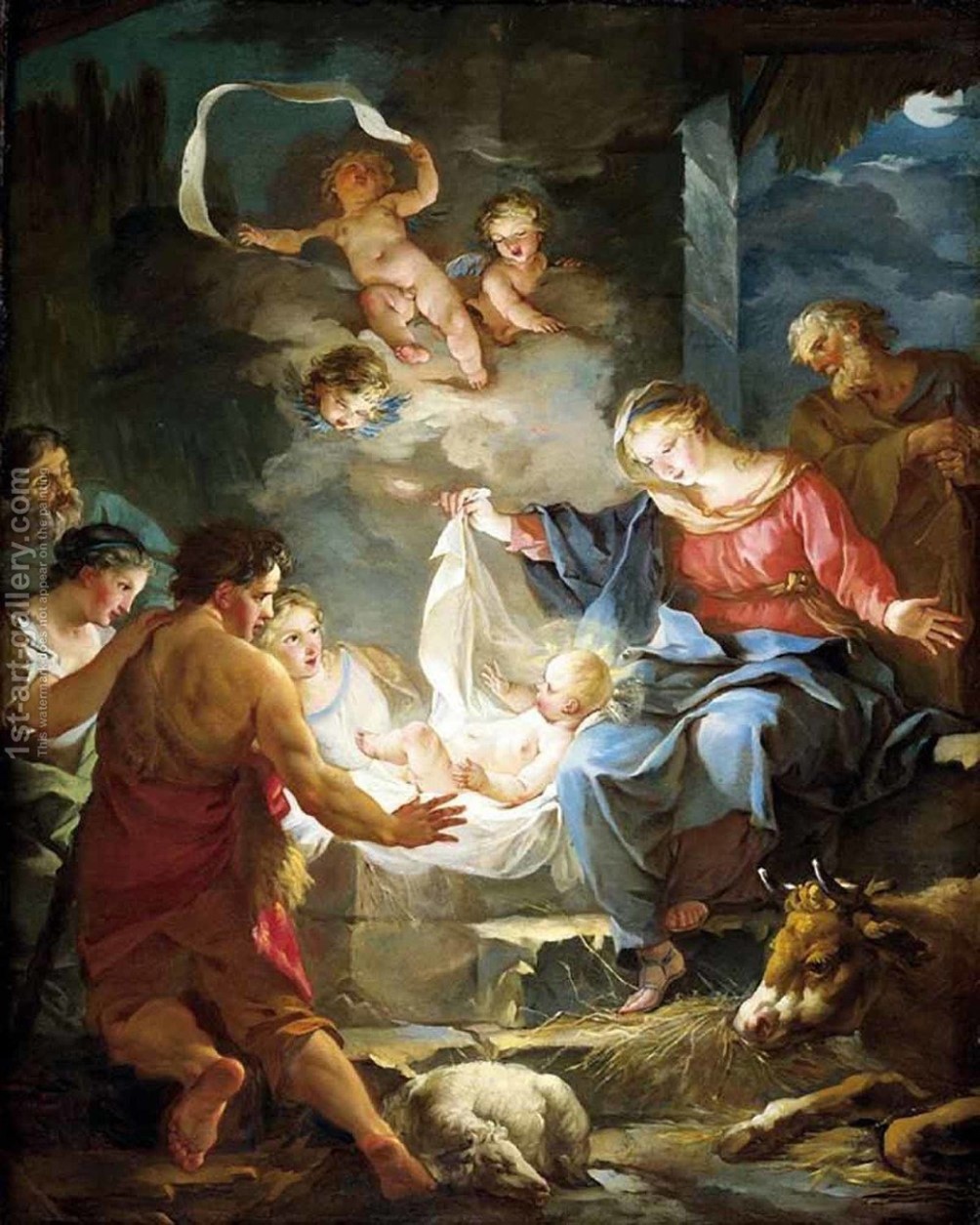
Christmas is almost here now, and this year I have heard on the radio statements like these: “This has to be a doubly special Christmas.”
I suppose what they mean is that after all we have been through this year, with the Covid-19 pandemic killing so many, and disrupting everyone’s lives, together with other social injustice issues that we have had to face, we all need to be “merry and bright” for a while.
There is nothing wrong with being “merry and bright”, with the social gatherings, the presents, the beautiful decorations, the family meals, etc. The problem is that when we focus only on these we may lose sight of the main thing.
What Christmas celebrates is actually the greatest turning point ever. There is a perfectly good reason to feel not only “merry and bright” but overjoyed and exultant in the highest degree.
The writer of the Letter to the Hebrews in Chapter 1 makes this point perfectly clear when he states:
“Long ago God spoke to our ancestors in many and various ways by the prophets, but in these last days he has spoken to us by a Son, Whom He appointed heir of all things, through Whom He also created the worlds.”
What the writer is saying is that God’s Word, the Son of the Father of all, by Whom all that is came into being, has come to live with us in flesh and bones.
Some of the prophets, like Isaiah, had already mentioned that a son of God would come to us as a child, and even if the prophet was not referring to the Messiah, but to an earthly king who would reign with justice and peace, the fact is that New Testament writers saw in these references a prefiguration of the Christ.
What the writer of Hebrews refers to here is what theologians call the great mystery of God’s Incarnation. And this is what the Christmas celebrations are really about.
What we celebrate is a wonderful mystery indeed. It is God Himself coming to live with us humans. God made flesh in the womb of the Virgin Mary by the power of the Holy Spirit and being born, according to St. Luke the Evangelist, in the town of Bethlehem (The House of Bread), which was the same town where David had been born and raised.
Never before had God become so approachable, so tangible, so close to us. His revelation was now made perfect for us. The Light that had before shone in His glorious deeds of liberation, and in His words communicated to the people through the prophets, was now shining in the face of a human baby who would become the man known as Jesus Christ.
And this Jesus Christ would show forth God’s Light in His words and deeds, and in His unconditional love towards humankind and the whole of Creation, which would demand His self-sacrifice on the cross.
After this happened, those who have heard or read the Good News of salvation, handed down from generation to generation by the New Testament writers, can no longer claim that they do not know who their God is. God has made Himself known to us in human form, and He has shown us the Way of Love as the true way to life everlasting.
We can choose to follow this Way of Life or reject it, but we can no longer claim ignorance. His Light has been clearly revealed to us.
So Christmas is the time of the greatest joy and exultation, a joy that surpasses our understanding and is certainly a million times more than being “merry and bright”. It is the time when we celebrate the greatest turning point in human lives.
Fr. Carlos Expósito, Rector
|
RETURN TO TOP
I Have Come to Do Thy Will, O God
This Sunday and Beyond - December 19, 2021
Get it in PDF form with calendar
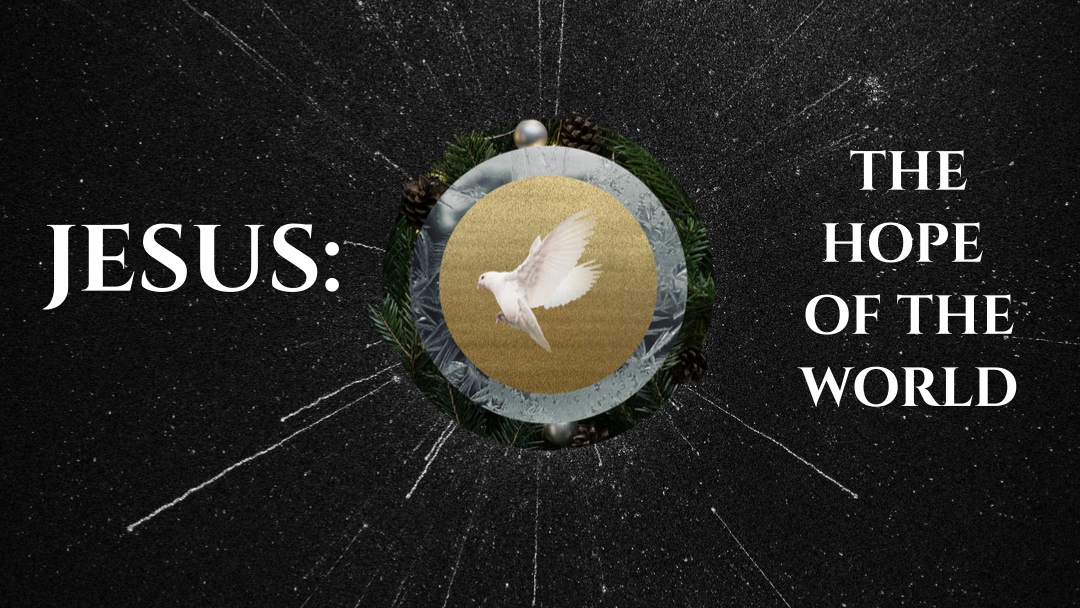
As the Advent Season comes to an end, the reading from the Letter to the Hebrews on this fourth and last Sunday before the celebration of God’s Incarnation brings us the theme of sacrifice (Hebrews 10: 5-10).
As theologians have emphasized, the wonderful mystery of God’s Incarnation that we celebrate at Christmas implies that God leaves His majestic and glorious realm and comes down to earth, made human flesh and born of the Virgin Mary, fully human, and yet, fully divine.
This is known in theological terms as God’s kenosis or self-emptying. So in its historical perspective Advent points to the mystery of God’s willing sacrifice to come to us as a human being.
But as we all know, the person of Jesus Christ, the incarnate God, is not simply the Second Person of the Holy Trinity who decided to become human so that we might come into closer contact with God’s love for us. Jesus Christ is, above all, the incarnation of perfect obedience to God’s will.
This is the main theme of the writer of Hebrews in the fragment of the letter that we read this Sunday.
The writer quotes the Greek version of Psalm 40: 6-9 and puts these words into Jesus’ mouth. The original Hebrew version reads: “Sacrifice and offering Thou didst not desire; mine ears hast Thou opened. Burnt-offering and sin-offering hast Thou not required. Then said I: Lo I come; in the volume of the book it is written of me. I delight to do Thy will, O God.”
The Greek version or Septuagint, which is probably the one the writer of Hebrews was familiar with (he may have not known Hebrew), reads “A body you have prepared for me” instead of “mine ears hast Thou opened”, but the idea is essentially the same: perfect obedience to God’s will.
The idea of Christ’s body being offered in obedience to God as the perfect sacrifice is, of course, better understood in the Greek version. Anyway, it was Jesus Christ’s willingness to obey God’s will, even if it meant giving His own body in sacrifice, that constitutes the perfect atonement for the world’s sins.
All other sacrifices that were offered to God, like the burnt offerings and all offerings for sins by the traditional Jewish religion meant nothing to the Creator of all that is. This is something that the prophets, like Samuel, Hosea, Micah, and Isaiah, and the writers of the Psalms had pointed out consistently. They all made it clear that what really pleased God was to obey Him, i.e., to do His will, which Micah properly translates as “to do justly, and to love mercy, and to walk humbly with thy God.”
Throughout His life and ministry while on earth, Jesus Christ did just that. He obeyed God’s will. He walked on the path of unconditional love and proclaimed justice and reconciliation for all. He showed His followers the radical Way of Love as the only way to true abundant life. And He was in unreconcilable opposition to the powers of evil, represented on earth by the oppressive worldly powers of His time. They unjustly condemned Him to death on the cross and may have thought they had defeated Him. But they were totally mistaken.
By raising Him from the tomb, God made Him beat the powers of evil and death. His ultimate obedience to God’s will was His ultimate victory, and it has brought us the justification from sins that no other sacrifice could bring us.
As we prepare to welcome Christ into our lives, let our hearts rejoice in thankfulness for His perfect sacrifice in obedience, and let us endeavor to imitate this obedience in our own lives.
“Thy Kingdom come; Thy will be done…”
May these be much more than mere phrases to be repeated as we recite the words Christ taught us in communal or personal prayer. May they be the main goal of our lives, so that, no matter how imperfectly, as God’s children, we also aim to incarnate Him on earth.
Fr. Carlos Expósito, Rector
|
RETURN TO TOP
The Joy of Repentance
This Sunday and Beyond - December 12, 2021
Get it in PDF form with calendar

The Third Sunday of Advent uses rose as its liturgical color. It is called Gaudete Sunday, because in the Traditional Latin Mass and the Novus Ordo the Introit is taken from Philippians 4: 4-5: Gaudete in Domino semper (Rejoice always in the Lord).
Although we do not normally use the Introit in our Episcopal Church liturgy, it is used in the liturgy of the English Missal for Anglo-Catholic Churches in England, and we do use Philippians 4: 4-5 as part of the readings for this day in Year C.
In any event, the tone of the Third Sunday of Advent is always one of rejoicing, as the liturgical color clearly shows.
The readings in Year C have the word rejoice—or a derived form of the word--in the Old Testament reading (Zephaniah 3: 14-20), Canticle 9 (Isaiah 12: 2-6) , and the Epistle (Philippians 4: 4-7).
However, as we come to the Gospel reading of the day (Luke 3: 7-18) we find John the Baptist’s really harsh—and even offensive—words for the crowds that came to him to be baptized in the Jordan River. He called them “brood of vipers” and asked them who had warned them to flee from the wrath to come.
His call to repentance was not a soft one. He urged the crowds that came to him to consider their lives and make haste to change what was not in accordance with God’s will. And his response to those who asked him what to do was very down-to-earth and concrete.
He simply told people to do what was fair and just: to the masses in general he encouraged them to share what they possessed with the needy; to tax collectors not to exact from the people more than what was due; to soldiers not to extort money by threats or false accusations and to be satisfied with their wages. He did not ask for unrealistic or even heroic deeds that required extreme sacrifice.
And he was clear about his mission. When some questioned him about the possibility of him being the expected Messiah, he clearly pointed out that one would come after him, whose sandals he did not consider himself worthy to untie.
And here he made clear the difference between his baptism of repentance as preparation for the coming of the Christ, and what Christ Himself would do at His coming: He would baptize us with the Holy Spirit, and He would purify us by gathering the good fruits of the Spirit in us in the loving communion of all the saints, and by allowing us to do away with all the uselessness that prevents us from being an integral part of this holy communion. This is what true repentance is all about.
St. Luke the Evangelist concludes this fragment by affirming that John the Baptist, with these and many other exhortations, proclaimed the good news to the people.
If we still have not grasped it, the news about what the Messiah will do at His coming, and the urgency to prepare for this blessed coming to our lives, cannot be compared in relevance to any other piece of news anyone might hear or read.
Yes, true repentance is, indeed, the greatest reason to rejoice in our Lord.
Fr. Carlos Expósito, Rector
|
RETURN TO TOP
Making Way for Salvation
This Sunday and Beyond - December 5, 2021
Get it in PDF form with calendar

Advent is the season of waiting in hopeful expectation for the coming of our salvation.
It is the season that reminds us of how God’s chosen people were called to prepare the way for Salvation, which broke through historical time more than twenty centuries ago.
It also calls to make way for our own salvation in the here and now, and assures us of the coming of a time when God’s Reign of Love will be all in all, and for the rejoicing of all.
St. Luke the Evangelist, as he clearly states in the introductory lines of his Gospel, had the intention to recount the wonders of Jesus’ life and ministry in an orderly manner, so he makes it a point to refer to the historical background surrounding the events he narrated. In this way he also makes it clear that the marks preceding the major salvific event he is depicting show us how eternity and time intertwine, how heaven and earth come together in God’s salvific plan.
The voice of John the Baptist, who refers to Isaiah’s prophecies, calls his contemporaries to repentance, i.e., to a transformation of mind that brings about a totally changed life that better reflects God’s will.
One of the features that should call our attention in St. Luke’s message about this preparatory time is that it is not a time of inactive waiting at all.
The passage is full of action verbs: prepare, make, fill, make low, make straight, make smooth.
So the preparation time is not idle time. It is not a “wait and see” time. It is a time in which we are all called to act, to make way, and this making way entails to work hard for the transformation of the path that our Salvation--incarnate in the person of Jesus Christ--is to tread, in order to make it smooth for Him to tread on it.
This preparation is not supposed to mean that unless we prepare the way Salvation will not happen. It will happen with our cooperation and also in spite of our opposition. However, if we are to be part of it, we need to engage actively in it.
Luke’s Gospel, with its detailed references to history, also reminds us that it is in our own time, in our present circumstances, that we are called to make the way smooth for Jesus to break through our personal lives, and through the lives of our communities, so that we may all be transformed by His radical love and bear witness of His love to the whole world.
Then, as St. Luke says, quoting Isaiah, “all flesh shall see the salvation of God.”
Fr. Carlos Expósito, Rector
|
RETURN TO TOP
Putting on the Armor of Light
This Sunday and Beyond - November 28, 2021
Get it in PDF form with calendar
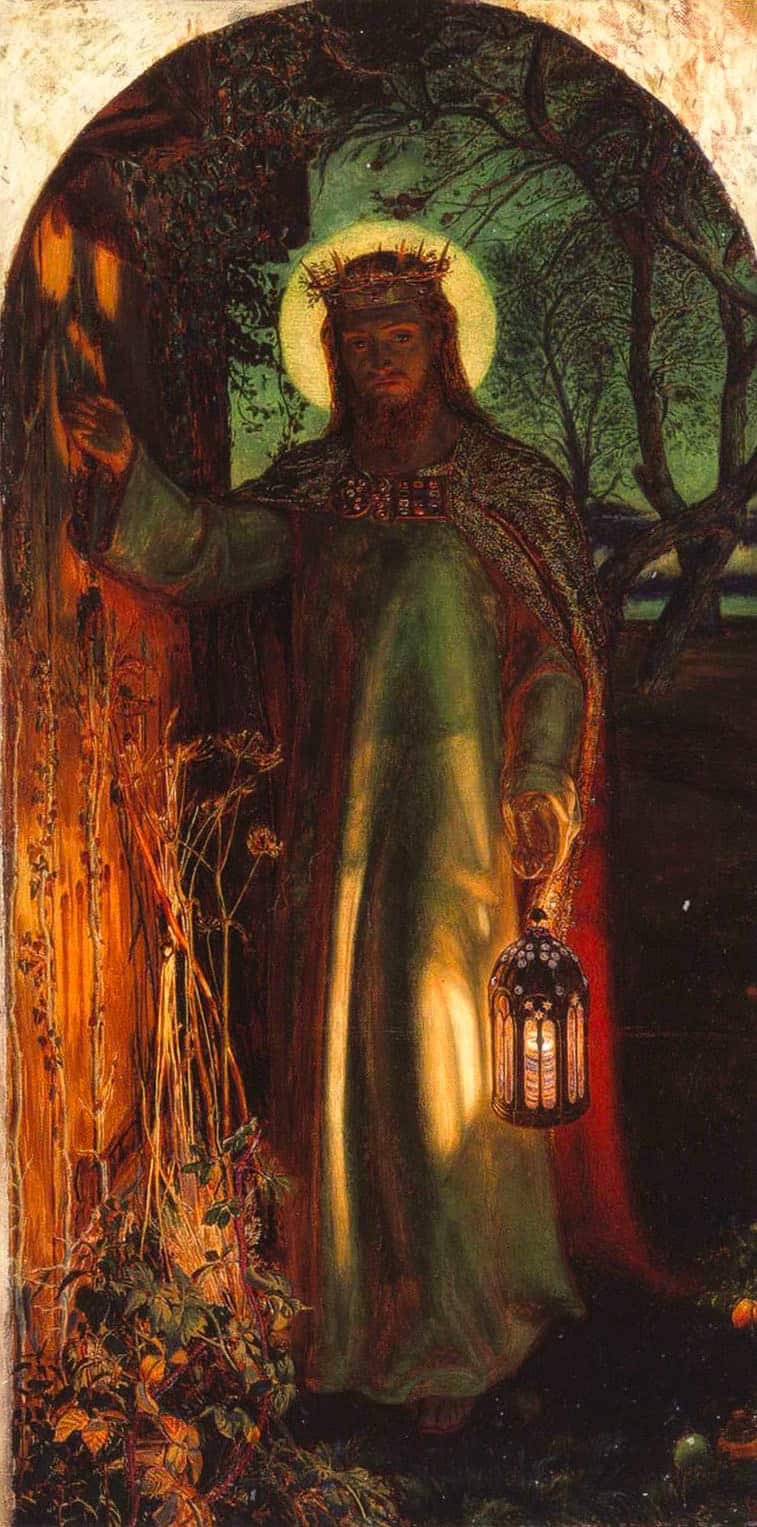
As November comes to its end and the last month of the year approaches, what comes to most people’s minds in our society is that the Christmas holidays are at hand.
The stores are already full of Christmas decorations and themes, radio stations broadcast Christmas carols and songs, and people are encouraged to buy presents for family and friends. “It’s the most wonderful time of the year” as the well-known song proclaims.
But what is actually wonderful about it?
First of all, what our modern secularized society has done is de-Christianize Christmas. In schools and public places it is much more common to hear “Happy holidays” than “Merry Christmas”. The explanation for this is that in a multicultural society as ours people from other religious (or non-religious) backgrounds may feel uncomfortable with the imposition of a Christian celebration on their lives.
The fact is that Christmas, despite the obvious overlapping of dates and some traditions with pagan religions, IS a Christian celebration. For Christians it is the celebration of God’s incarnation on this planet. That is the real wonderful news that Christmas conveys. All other notions of “a time to be reconciled and live in peace and harmony” are directly derived from the wonderful mystery that Our Creator emptied Himself of His glory and became flesh as the baby Jesus.
Moreover, Christmas is a season that comprises 12 days, from December 25 to January 5. The well-known English carol “The Twelve Days of Christmas” attests to this fact.
So we are not in the Christmas season yet. We are starting the Christian year with the season of Advent, a season that comprises four weeks.
The season of Advent is mainly a season of expectation and preparation for the mystery of Incarnation. As such, it may be thought of as a joyous time, but it also implies a penitential aspect that has often been overlooked in the last decades.
The readings for Advent, however, are clear in pointing out to us Christians that this is a time in which we need to “cast away the works of darkness and put on the armor of light” as the collect for this first Sunday of Advent says.
As we get ready to celebrate the wonderful mystery of God made flesh, we are also preparing to receive Him in our own lives, and look forward to a time when He will be the absolute ruler of the world.
This is the triple past-present-future perspective of Advent, which must in fact be the constant perspective in our lives.
But there can be no true preparation without purification. The rooms of our lives need to be decluttered and cleansed, if we are to receive Him who is light and life made flesh.
So let us take the reading of scripture seriously, pray, meditate, and do good deeds for our neighbors, so that with the aid of the Holy Spirit, we may leave behind what keeps us away from God’s love and from the love of one another. Only after we have tried our best to do so, can we come to the Christmas season with the genuine feeling that it is actually “the most wonderful time of the year.”
Fr. Carlos Expósito, Rector
|
RETURN TO TOP
|


























































